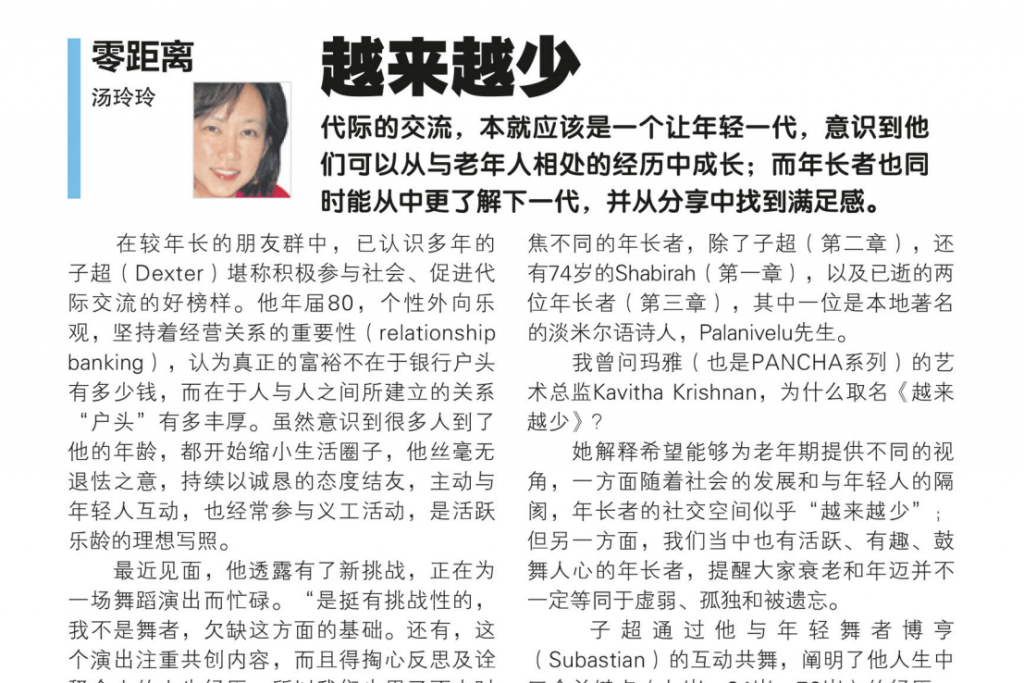NAI News
Ideas Festival 2024: Shining a Spotlight on the Importance of Social Science and Humanities Research on Society
IN BRIEF | 5 min read
- Launched on 20 March 2024 with Minister for Education Mr Chan Chun Sing as the Guest of Honour, this festival was organised by the Autonomous Universities (AUs) in Singapore and is supported by the Social Science Research Council (SSRC). It features 13 events over a month-long period.
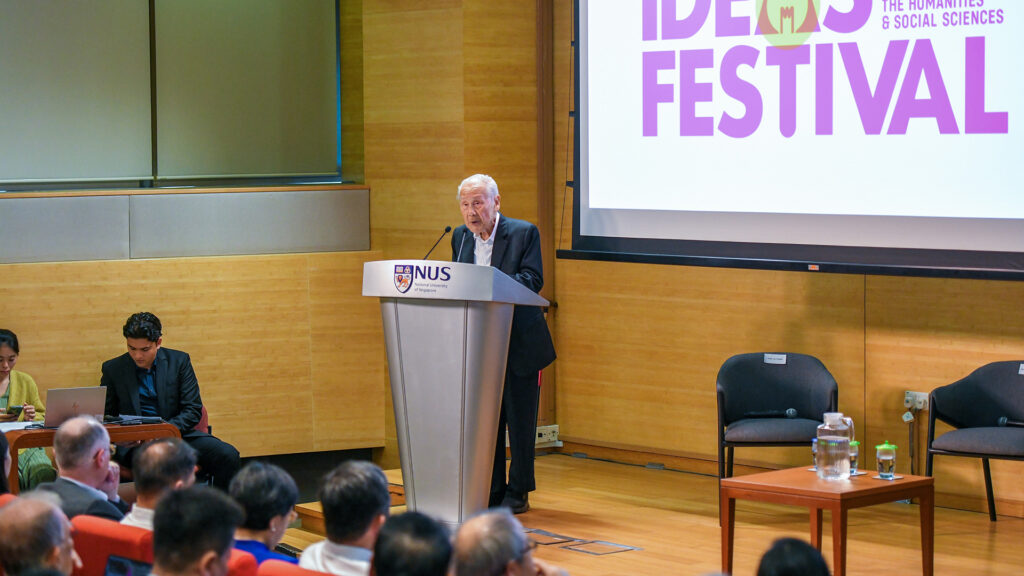
How does research in the social sciences and humanities impact our world? This is a question the inaugural "Ideas Festival 2024 - Insights from the Humanities and Social Sciences" seeks to address as it delves into the intricate challenges confronting Singapore and the region amid a period of disruptive change by drawing on the works of the local Social Science and Humanities (SSH) research community.
Launched on 20 March 2024 with Minister for Education Mr Chan Chun Sing as the Guest of Honour, this festival was organised by the Autonomous Universities (AUs) in Singapore and is supported by the Social Science Research Council (SSRC). It features 13 events over a month-long period.
At the launch event, SSRC Advisor Professor Wang Gungwu who is also NUS University Professor, highlighted the importance of SSH research in enriching our understanding of social issues, which are inherently complex and dynamic, shaped by historical developments and disrupted by the latest technological advances.
Against this backdrop, he urged more work to be done to understand Singapore's multicultural society and the complex environment in which it exists. One approach is to encourage researchers to consider having Co-Principal Investigators from a mix of academic disciplines in the humanities, social science as well as the science, technology, engineering, and math (STEM) fields. "What I envisage is that research proposers are open-minded to different perspectives that could lead them to something fruitful they did not expect to find. A variety of insights coming from scholars with different backgrounds makes that possible."
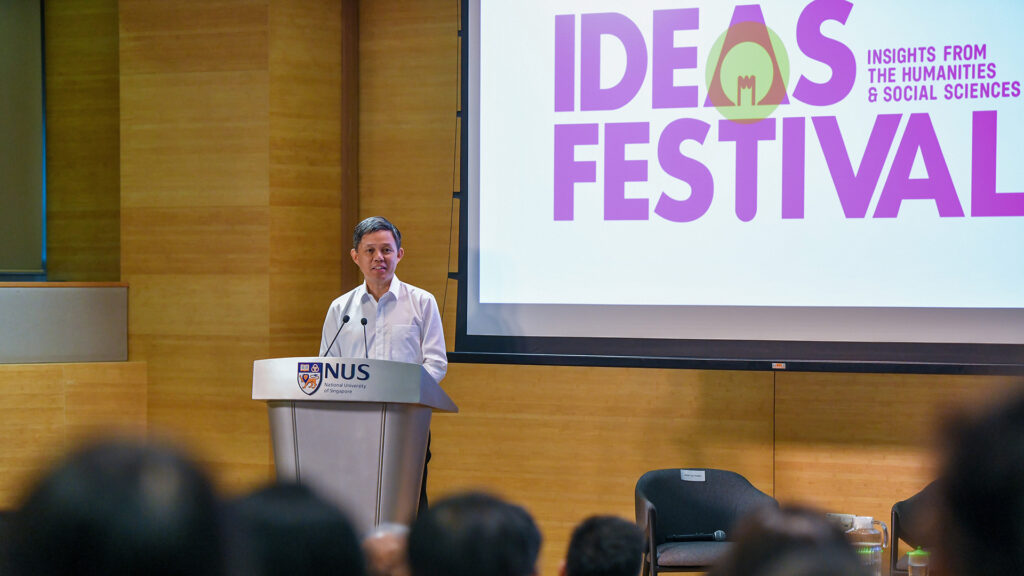
Echoing the importance of SSH research, particularly in a STEM-focused world, Professor Elaine Ho, Chair of the Ideas Festival Organising Committee and Vice Dean of Research at the NUS Faculty of Arts and Social Sciences, said at the sidelines, "Social science and humanities research is very much part of our everyday lives," citing examples such as mental health and children's health outcomes, which are concerned with the behavioural dynamics within society. "Social science and humanities researchers have these kinds of insights that can help us to improve the way that we try to better society," she noted. "There has been much more attention given to STEM research subjects in the Singaporean landscape…but where the opportunity lies for both the STEM subjects as well as social science and humanities is by coming together."
The festival features more than 50 researchers across a spectrum of expertise in SSH sharing key insights on a range of topics. These include the impact of digital acceleration and disruptive technologies like the metaverse and artificial intelligence (AI) on childhood, an inclusive future of work, new forms of social interactions, as well as fake news and misinformation in the media. It will also touch on strengthening support for mental health and well-being through a whole-of-society approach, such as leveraging family and social circles to support the well-being of individuals across various stages of their lives.
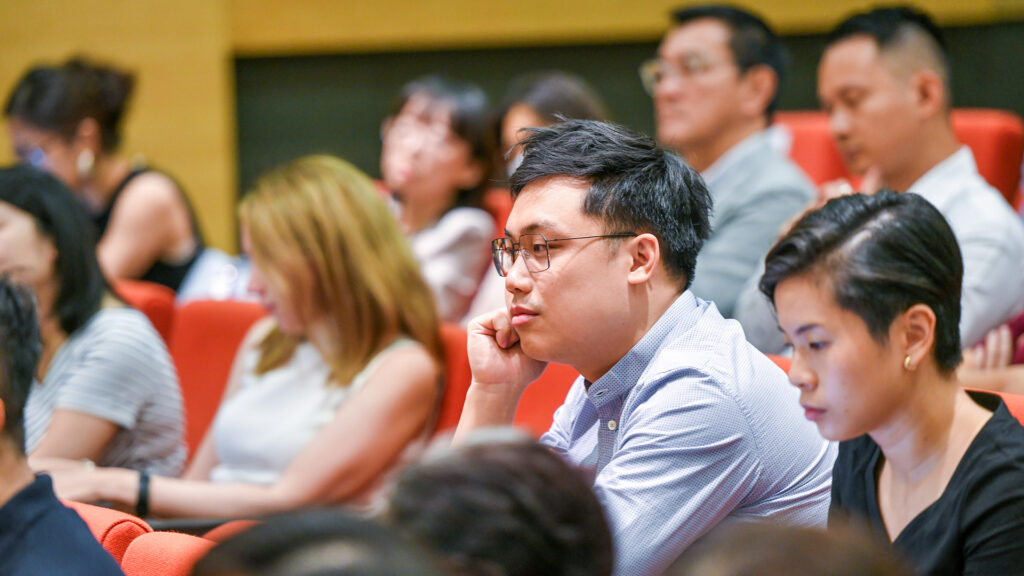
Acknowledging how the scholarship of social science and humanities in Singapore has made significant progress, Chairman of the SSRC, Mr Peter Ho, said, "You just need to look at the span of interesting projects in the universities and research institutes to get a sense. Public sector agencies have also taken greater interest, indicating the increasing traction of the social sciences and humanities among policy researchers (and) policymakers. By bringing together researchers across the universities and research institutions, the Ideas Festival clearly signals that the research ecosystem is vibrant and thriving."
NUS is the host of two events at the festival. The first, "Gazing into the Metaverse", which was held on 26 March 2024 looked at how the metaverse - a world of avatars, digital twins and digital currencies - will be built, how it will be curated, who will use it, and how it will transform our everyday lives. The roundtable examined the key questions, implications and themes that researchers in the social sciences and humanities are now asking about this next stage in our digital journey, particularly in Asia.
The other, "Foundations of Home-Based Work", will take place on 12 April 2024 and will explore the spatial, social and technological dimensions of home-based work (HBW) in Singapore. This is done through looking at considerations such as the policy framework surrounding this type of work and exploring the following questions: who is involved in it; what kind of living do they make; in which housing types and neighbourhoods is this work occurring; and the pathways for accommodating HBW in our lives through design and policy recommendations.
On 17 April 2024, the University will also co-organise "Singapura Before Raffles: Early Modern Asia in the Global Renaissance", which will discuss how early modern Singapore and Asia played important roles in shaping global ideas about maritime trade, global commerce, international law, political governance, and literary and artistic advancement. It will draw on new and exciting interdisciplinary research from teachers and scholars across Singapore's universities and the wider Asia region.
The Ideas Festival 2024 runs till 19 April 2024. More information can be found here.
This story by the NUS Faculty of Arts and Social Sciences first appeared in NUSNews on 3 April 2024.
Financial Training Programme by NUS Aims to Boost Efforts of Social Workers, Frontline Staff and Volunteers
IN BRIEF | 6 min read
- The Financial Capability and Asset Building (FCAB) Training programme funded by Citi Foundation was first rolled out for social workers in 2020 and will be expanded to frontline staff and volunteers from 2024, after a successful pilot in 2022.
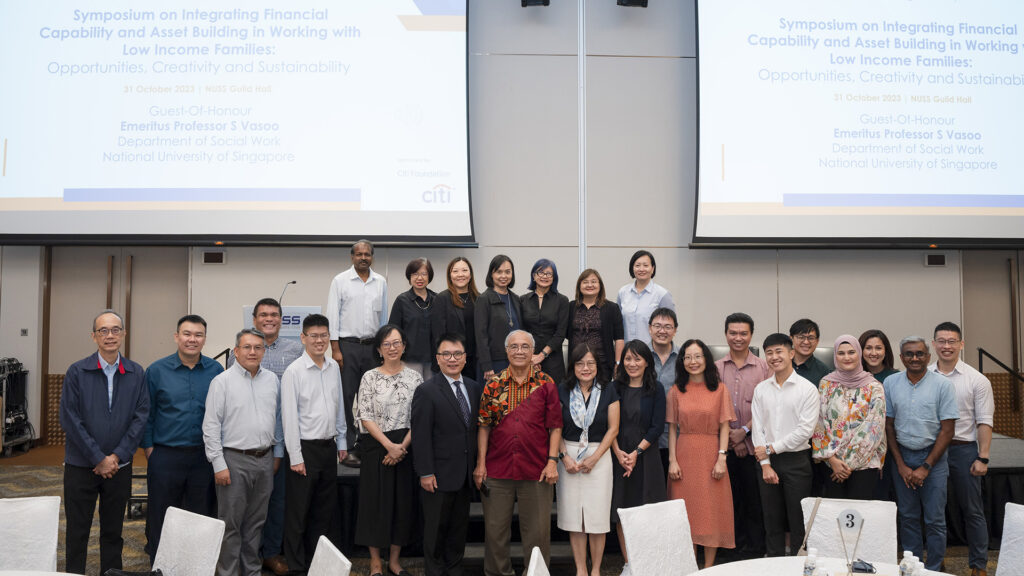
The family dedicated $3,000 a month to repaying the debts, leaving them with little for the daily needs of seven family members; three young children, two elderly grandparents, along with Mr and Mrs Tan.
Overwhelmed by the debt situation, Mrs Tan reached out to a Care Corner Family Service Centre, which helped the family secure subsidies for childcare services and provisions such as milk powder and diapers.
However, Care Corner did not stop there. Mrs Tan's assigned social worker also educated her on the nitty-gritty of financial planning. By improving her financial capability, Mrs Tan was able to reduce the family's debt and cultivate better spending habits.
"Although not all who struggle financially are low-income households, a large proportion of them are. But whatever their background, we need to educate them on Financial Capability and Asset Building so that they have the tools and knowledge to plan for a more sustainable financial future" said Mr John Teen, Manager of Care Corner Family Service Centre (Admiralty), at a symposium organised by the NUS Faculty of Arts and Social Sciences' Next Age Institute (NAI) on 31 October 2023.
The symposium, titled Integrating Financial Capability and Asset Building (FCAB) in Working with Low Income Families: Opportunities, Creativity and Sustainability, was organised to discuss how FCAB can be integrated in working with low-income families. FCAB Training was first rolled out for social workers in 2020 and will be expanded to frontline staff and volunteers from 2024, after a successful pilot in 2022. The FCAB Initiative is funded by Citi Foundation.
FCAB aims to empower individuals and families to make sustainable financial plans and safeguard their money by first equipping social workers and frontline officers with knowledge and skills on household financial matters and asset building. They can then journey with clients through their various issues towards financial sustainability.
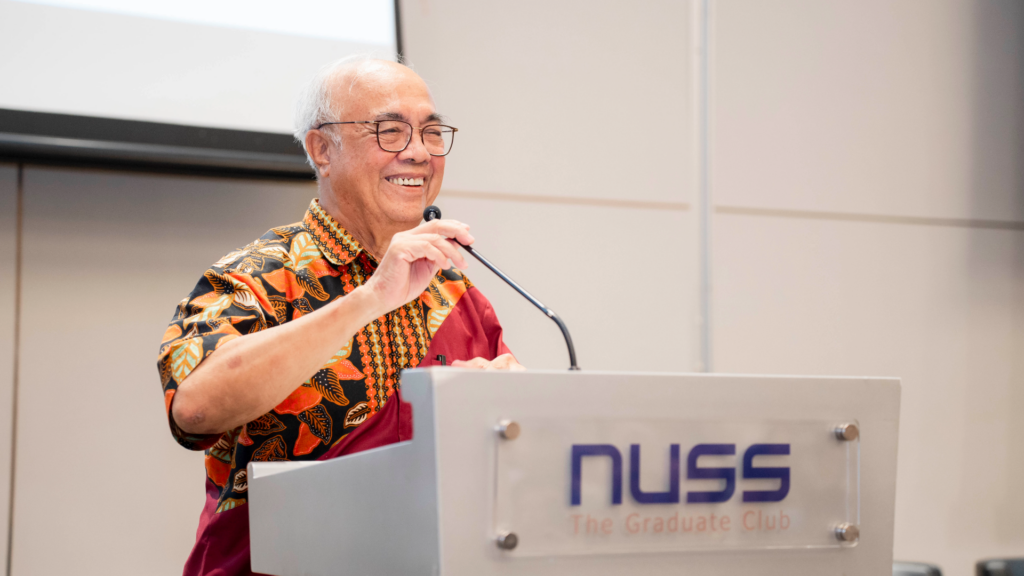
This is an issue particularly pertinent to Singapore, said Emeritus Professor S Vasoo, the symposium's Guest of Honour. "We need to ask if there is hope for low-income households to move beyond providing for basic needs to climb up the economic ladder," added the former Member of Parliament.
"We need to do more than overcome poverty - we must cover all the bases of financial equity, stability, security, safety, sufficiency and resilience," said Professor Jin Huang, Professor of Social Work at Saint Louis University in the United States, who was the symposium's keynote speaker.
Working together to build a sustainable financial future
The comprehensive goal of FCAB is reflected in its "whole life perspective" approach.
"Building financial capability is a cumulative process of knowledge and financial management built over time - we must keep walking with clients even after their immediate issues are resolved," said Adjunct Associate Professor Corinne Ghoh, NAI's FCAB Initiative Project Lead. "Although these journeys may be long, they are worth the investment."
Besides community cases like the Tan family, FCAB has also been applied to the prison setting.
"At Singapore Prison Services, we want to help inmates reintegrate into life after release. Financial vulnerability can be a potential stressor after they are released, and financial struggles can even lead them to reoffending," noted Dr Joyce Chan, Assistant Director, Community Partnership/Rehabilitation & Reintegration Division, at Singapore Prison Service (SPS).
"Through FCAB knowledge and skills, SPS officers can work with inmates on financial matters right from the onset of incarceration to help them," she added.
The results have been positive, with prison officers and volunteers reporting that the training has made them "more confident in guiding inmates on financial matters".
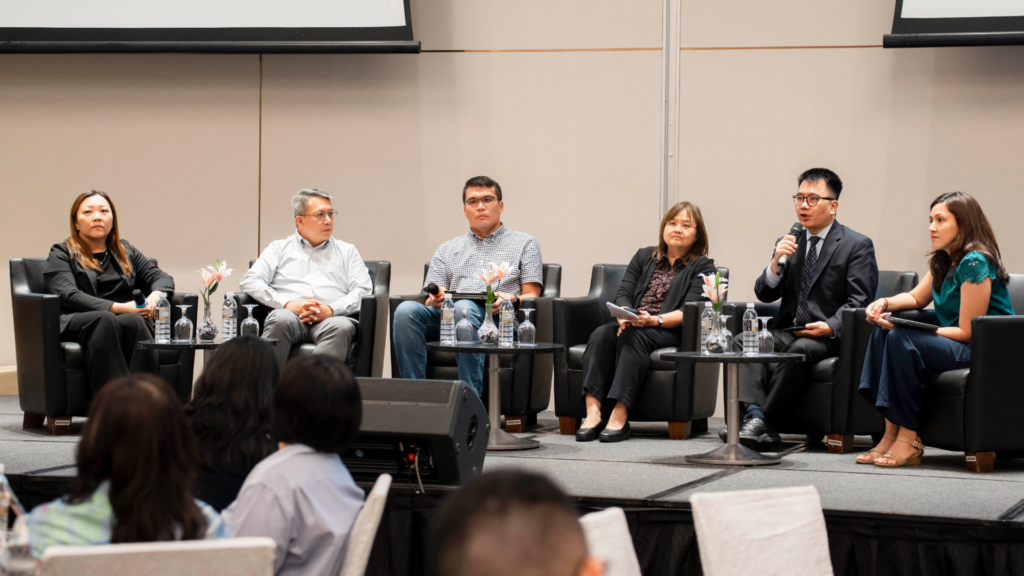
Speakers at the symposium believe that a concerted effort is needed in using FCAB approaches to provide an integrated nexus of help to support low-income clients in achieving sustainable outcomes.
"We need all the different levels - practitioner, organisational and even policy - to come together intentionally and work towards our common goal of improving social mobility," said Mr Barry Ryan Shah, Assistant General Manager, Regional Services (SSO@ Bedok & Geylang Serai), Ministry of Social and Family Development (MSF), in response to a question during the panel discussion.
Prof Huang added: "Practitioners as the first touchpoint can set clients on the course towards long-term financial stability, but organisations and policy makers need to understand the emerging needs on the ground from practitioners so that they can form better solutions, even through innovation such as fintech and artificial intelligence."
This story first appeared in NUSNews on 16 November 2023.
Coming Together in a Whole-of-Society Approach to Address Singapore's Ageing Population Challenges
IN BRIEF | 5 min read
- The profiled alumna Ms Siti Adriana Muhamad Rasip is the co-founder of Empowered Families Initiative, which seeks to harness the strengths and abilities of low-income families by investing in their aspirations, and took home the top honours at the inaugural =Dreams Asia Breakthrough Prize Competition, a nationwide contest of ideas to eradicate poverty.
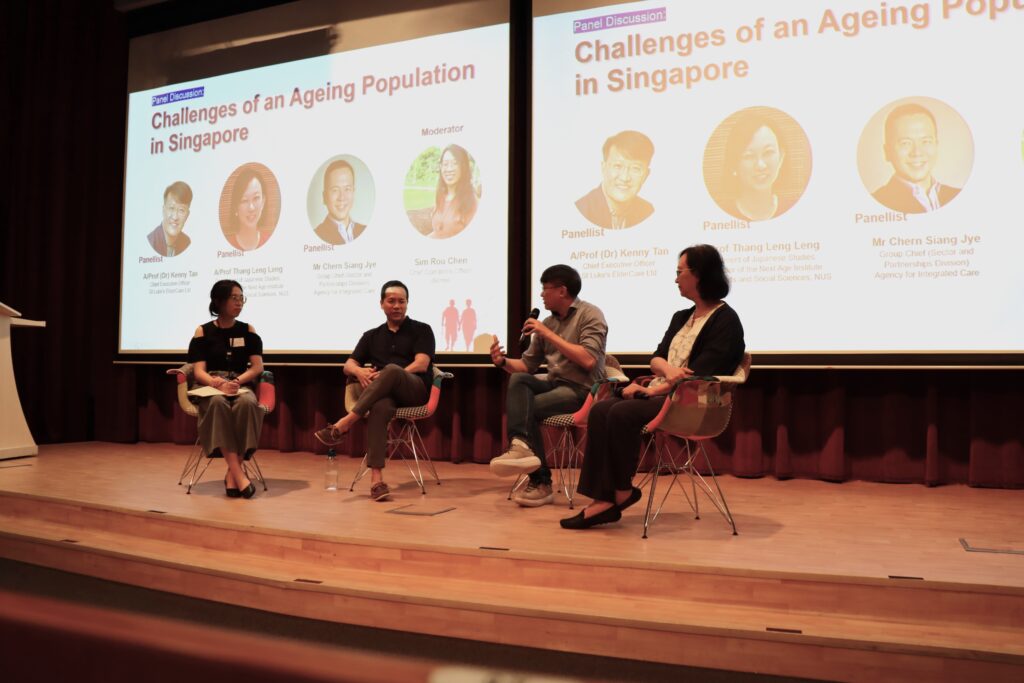
How can the whole of society be mobilised to tackle the challenges of an ageing population in Singapore? As the Singapore population demographic greys progressively, this question was at the centre of discussion at the annual symposium of the NUS Chua Thian Poh Community Leadership Centre (CTPCLC).
Held on 30 September at NUS University Town, the symposium gathered more than 120 attendees consisting of NUS students, staff and alumni, as well as stakeholders from the public and social sectors. Now in its 11th iteration, the in-person event saw changemakers, community leaders, and thought leaders discussing the issue of 'Challenges of an Ageing Population in Singapore', and how different organisations and individuals are doing their part to tackle this challenge.
The event was graced by Guest-of-Honour Mr Tan Kiat How, Senior Minister of State for Ministry of Communications and Information and for National Development, and Adviser to East Coast GRC Grassroots Organisations.
Noting that Singapore is home to some of the world’s longest living persons, Mr Tan highlighted the importance of closing the gap between life span and health span, adding that this is where everyone has a role. Mr Tan also reflected on his experiences of encountering seniors forming social networks and actively volunteering in the community, to overcome social isolation.
Expressing his delight that the CTPCLC curriculum has offered undergraduates a path to support these initiatives with their research and involvement in the community, Mr Tan expressed that this would bode well for our community, as it takes an all-of-community approach to tackle the challenges of an ageing society like Singapore.
Holistic Approaches to AgeingAttendees at the symposium delved into a thought-provoking hour-long panel discussion elaborating on efforts and plans to address the challenges of the ageing population in Singapore. Moderated by CTPCLC alumna Ms Sim Rou Chen, Chief Operating Officer of WeHiro, panellists Mr Chern Siang Jye, Group Chief, Sector and Partnerships Division, Agency for Integrated Care; Associate Professor (Dr) Kenny Tan, Chief Executive Officer of St Luke's ElderCare Ltd; and Associate Professor Thang Leng Leng from the NUS Japanese Studies and Co-Director of the Next Age Institute, NUS Faculty of Arts and Social Sciences), exchanged stories, insights, and recommendations on effectively addressing the challenges posed by an ageing population.
The discussion explored topics such as healthcare management, social support systems, and policy interventions, all designed to address key challenges faced by the elderly in our community. Assoc Prof (Dr) Kenny Tan captured the challenges succinctly in three words: helplessness, loneliness and boredom.
These thoughts were also echoed by Assoc Prof Thang Leng Leng, who spoke about loneliness and social isolation, even for elderly parents who may be living with their children, when conversations within the home could be limited to routine check-ins such as “Have you taken your medicine today?”
The discussion underscored the real need for elderly among the community to be actively engaged – and that the community can play a part through raising awareness of the former’s needs and supporting befrienders’ programmes, in ensuring that seniors can age amidst a strong social support network.
From Engagement to EffortSince its establishment in 2011, CTPCLC has continually challenged and empowered its students to explore the many facets of Singapore society and consider solutions to alleviate and address societal issues. CTPCLC students’ thoughtful analyses and implementations were showcased at the symposium through presentations, demonstrations and poster displays.

CTPCLC students and project partners Charmaine Song (Business, Year 4) and Tong Hui Yi (Social Work and Sociology, Year 4) took to the stage to elaborate on a year-long project they had embarked on in partnership with Thye Hua Kwan Moral Charities Limited.
During their project, which was titled ‘Reimagining the Active Ageing Centres (AACs) of Thye Hua Kwan’, Charmaine and Hui Yi interacted with seniors who were service users at Active Ageing Centres (AACs) in Ang Mo Kio. From the conversations, they gathered the seniors’ various opinions and hopes on how the AAC could further develop to serve Singapore’s ageing population.
Adopting a mixed methods approach that incorporated the use of observation work, semi-structured interviews, focus group discussions and online surveys, their study revealed that future AACs can play a vital role in serving as important sources of social, cultural and spatial capital for seniors: AACs provide social capital through important networks and social support among seniors; cultural capital by being a hub for acquiring new knowledge that will empower them; and spatial capital by being a potential ‘home away from home’, enabling seniors’ access to additional spaces of emotional and physical comfort.
The study also put forth key recommendations that highlighted how AACs can be further developed as a space for intergenerational communal socialisation, while serving as a rallying site for proactive seniors to engage in community-related volunteerism.

Beyond talks and discussions, attendees at the symposium also engaged with passionate CTPCLC alumni and students at a series of live demonstrations and poster displays detailing their various engagements with the community.
Amongst these was a demonstration by CTPCLC alumnus Mr Willoughby Niki Lee (College of Design and Engineering, Class of 2022) of his brainchild BoomBox - AI-based gamified activities innovated to help in seniors’ wellbeing, inspired by his love for the community and his engineering knowledge.

Ms Sim Rou Chen (Social Work and Psychology '22) also led an ageing simulation demonstration which allowed participants to experience what ageing could feel like, through the use of props and equipment like goggles, walking sticks and sandbags which hinder physical movement. Through this, participants developed a greater understanding and empathy of the physical, and thereafter, social and emotional, encounters and challenges that seniors could be facing in their daily lives.
Celebrating Tomorrow’s ChangemakersA ceremony was also held at the symposium to honour the achievements of CTPCLC’s Class of 2023, acknowledging their completion of the community development and leadership programme in NUS and celebrating their achievements in driving positive change within communities in Singapore.

“The Symposium has come at an opportune time as I begin my career in the community care sector,” said CTPCLC alumni Mr Kho Yong Xiang (Communications and New Media '23).
“CPTCLC has once again proven to be an invaluable platform for addressing the priorities of today. I heard peers discussing their ground-up research as well as connecting with partners and experts in the eldercare space. I am thankful for my time at the Centre and hope for more students to embrace the opportunities offered by CTPCLC,“ he added.
Beyond academics, the annual CTPCLC symposium provides a platform for like-minded individuals to share knowledge, foster collaboration, and inspire future leaders to address pressing community issues, making a difference to those around them. From their first tentative steps of taking courses at CTPCLC, the symposium also documents how students have been empowered to develop themselves further into passionate community builders and future leaders.
“In addition to the good work our alumni and students are doing in the community, it is really heartening that they continue to engage the Centre at an event like this one,” said Associate Professor Chng Huang Hoon, Director of CTPCLC. “I feel very proud to have been a part of their wonderful journey."
This story by NUS Chua Thian Poh Community Leadership Centre first appeared in NUSNews on 16 October 2023.
Call for Nominations | FASS Inspiring Mentor Award 2022
IN BRIEF | 3 min read
- We invite NUS FASS members of staff to nominate the colleagues who have served as their truly inspiring mentors - who have gone beyond the call of duty to positively impact their work and life - for FIMA 2022 honours.
Click through image below (or just write to fassmentoraward@nus.edu.sg) to file your nomination.
Commencement 2022: Kickstarting a Season of Celebration and Achievement
IN BRIEF | 10 min read
- NUS celebrates the milestone accomplishments of 13,975 graduates through 28 in-person ceremonies.
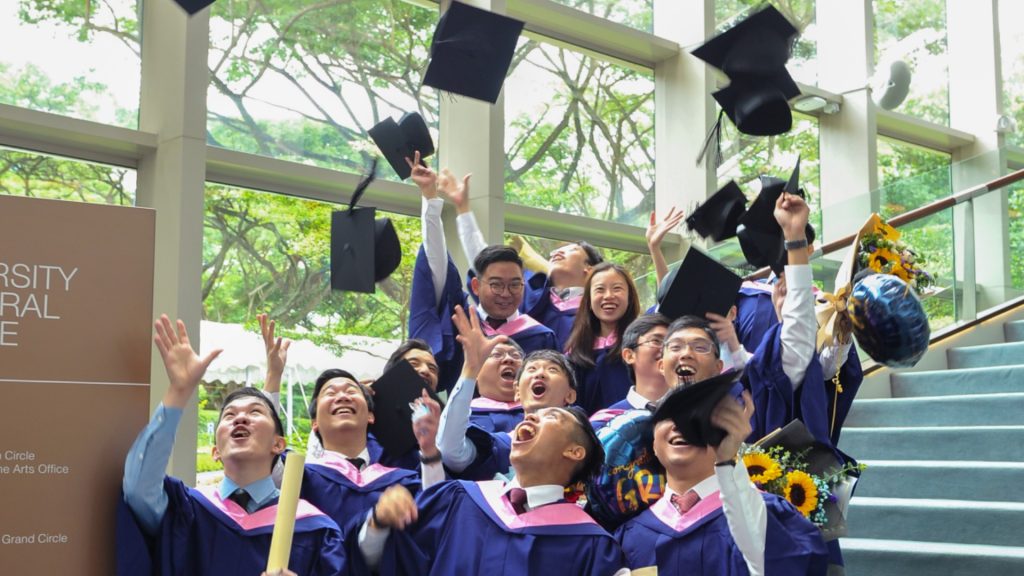
A long-awaited season of celebration is officially under way, with the inaugural ceremony of Commencement 2022 marking the milestone achievements of some 200 Faculty of Arts and Social Sciences (FASS) graduates, and seeing the conferment of two Honorary Graduates, Professor Tommy Koh and Professor Wang Gungwu.
Taking place at the University Cultural Centre, the ceremony kicked off bright and early on 6 July to an effervescent buzz of anticipation from the graduates and their loved ones, inaugurating a total of 28 in-person ceremonies to be held over the following 10 days.
In keeping with the Commencement traditions and the proud ceremonial heritage of NUS, the ceremony showcased the pageantry of the Ceremonial Procession, the fanfare, and playing of the National Anthem, all culminating in the highlight of the ceremony-the presentation of graduates. Graduates from the Class of 2022 celebrated their achievements amid the applause of family and friends, a momentous apogee of their time in NUS.
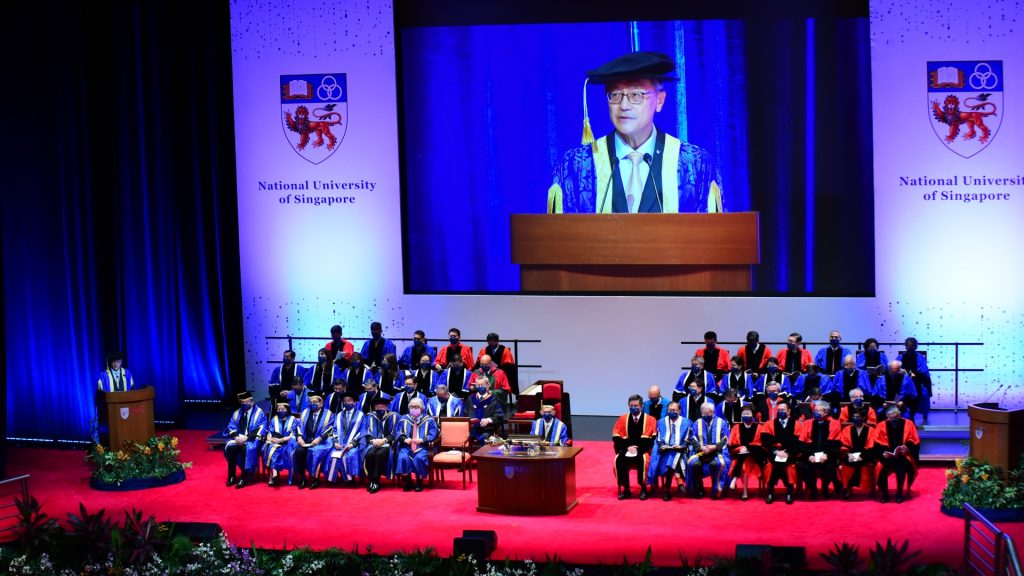
Speaking at the ceremony, NUS President Professor Tan Eng Chye reflected on the qualities needed for graduates to thrive in today's dynamic environment: an attitude of resilience and adaptability to overcome challenges, and a willingness and boldness to view problems as opportunities, exercise creativity, and apply their skills and knowledge to create solutions.
"For the Class of 2022, you are crossing the threshold into a wider world of dynamic change and great possibilities, but also of discomforting uncertainty," he said.
"But I am fully confident that the NUS graduates of today share the same ethos of excellence and service to community of generations past. In time to come, you will undoubtedly make your own unique contributions, and become the vanguard in elevating our collective prosperity and well-being."
Contributions to Law, Nature and Culture: Prof Tommy KohTwo illustrious NUS alumni were also honoured as Honorary Graduates for the Class of 2022-lawyer and diplomat Professor Tommy Koh, and historian Professor Wang Gungwu.
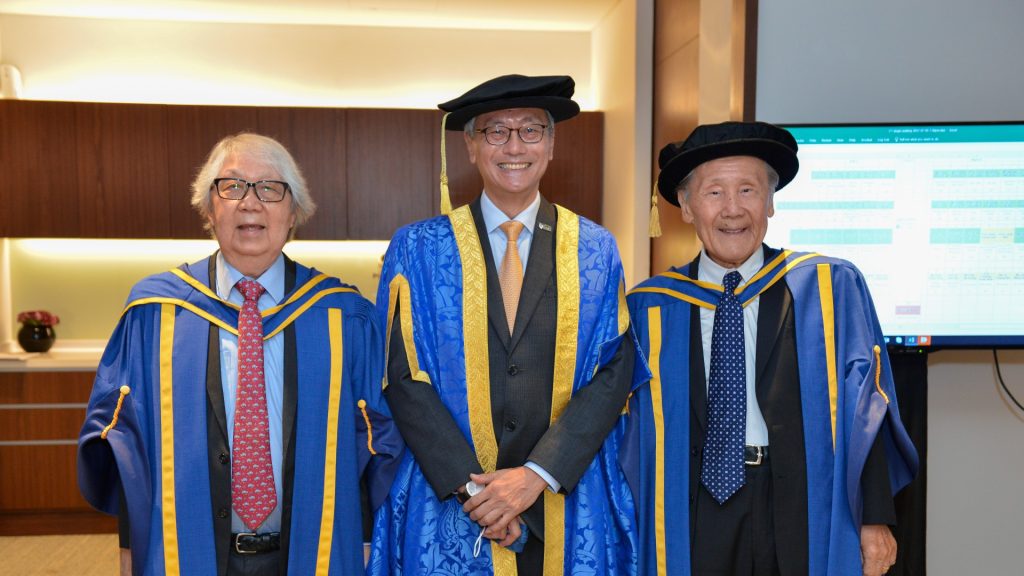
In recognition of his dedication as a practitioner-scholar and decades of service to the University, Singapore, and the world, Prof Koh, who wears many hats including Ambassador-at-Large at Singapore's Ministry of Foreign Affairs, Special Advisor of the Institute of Policy Studies, and founding Rector of NUS' Tembusu College, was conferred the Honorary Degree of Doctor of Laws.
Highlighting three areas on which he has focused his energies - law, nature, and culture - Prof Koh said, "I chose to study law, not to enrich myself, but to pursue justice and to promote the rule of law."
He also spoke about his work concerning nature and the environment, including chairing the 1992 Earth Summit, being patron of the Nature Society, and helping NUS establish the Lee Kong Chian Natural History Museum as its founding Chairman. "My vision is to live in harmony with nature. My agenda is to promote sustainability in all our endeavours," he added. "I am [also] glad that I have been able to play a very small role in transforming Singapore, from a cultural desert to a cultural oasis."
Delivering the citation for Prof Koh's conferment, Professor Simon Chesterman, Vice-Provost (Educational Innovation) and Dean of the NUS Faculty of Law and NUS College, referred to Prof Koh's "academic milestones [which] are but one strand of the rich tapestry of his professional life", as well as his leadership and guidance in education at NUS, and his eminent contributions to state and environmental diplomacy.
An Inspiring Story Worth Retelling: Prof Wang GungwuProf Wang, one of the world's foremost experts on the Chinese diaspora and Sino-Southeast Asian historical relations, was conferred the Honorary Degree of Doctor of Letters, the latest in a long list of accolades that includes the prestigious Tang Prize in Sinology, and the Distinguished Service Order of Singapore.
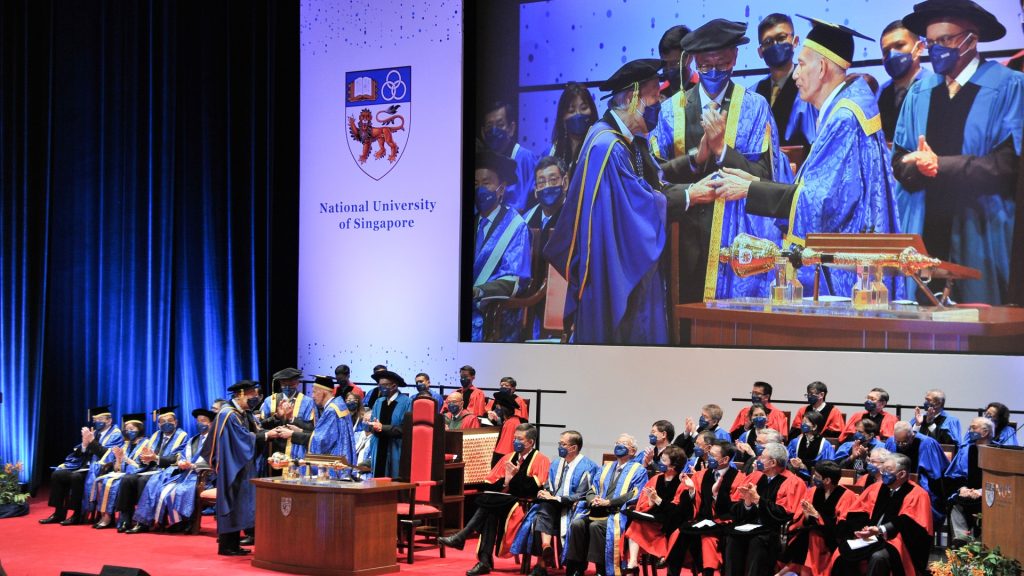
Reflecting on his time as a student of the University in colonial Malaya, Prof Wang said: "You can imagine how happy I am to be a graduand again with my alma mater. The university gave my generation a good start in life. It went on to adapt to the rapid changes of our time. In so doing, it has come out better and stronger."
He spoke about the "inspiring story worth retelling" of how the University had set out and followed its own aspirations, becoming a major centre of learning by being actively connected to the world, as well as regularly reinventing itself.
"The way our university strives to keep our humanity always in our sights is something to be very proud of. I hope that all of us graduating today, no matter where life leads us, will never hesitate to help our university to enhance this capacity to advance our human condition," Prof Wang stressed.
Prof Lionel Wee, Dean of FASS and co-Dean of the College of Humanities and Sciences, who delivered the citation on Prof Wang's conferment, lauded the latter as "an eminent figure and brilliant mind" who has made manifold contributions as a leading figure in Sinology, a renowned public intellectual, and a visionary leader and administrator at leading academic institutions around the world.
"This doctorate symbolises the meaningful connections between Professor Wang and the University, and it celebrates the long-standing contributions and value that Professor Wang's scholarly insights bring to Singapore, to Southeast Asia and, indeed, to the world," he said.
Parsing the Path ForwardInfusing the celebrations with a spirit of introspective gratitude, Valedictorian Mr Nickson Quak, who is graduating with a Bachelor of Arts with Honours (Highest Distinction) in Philosophy, Politics, and Economics said, "As varied as our journeys may have been, each and every one of us graduates here could have only made it thus far because of the unwavering support that our parents, our families, our loved ones, and our friends have so generously afforded us."
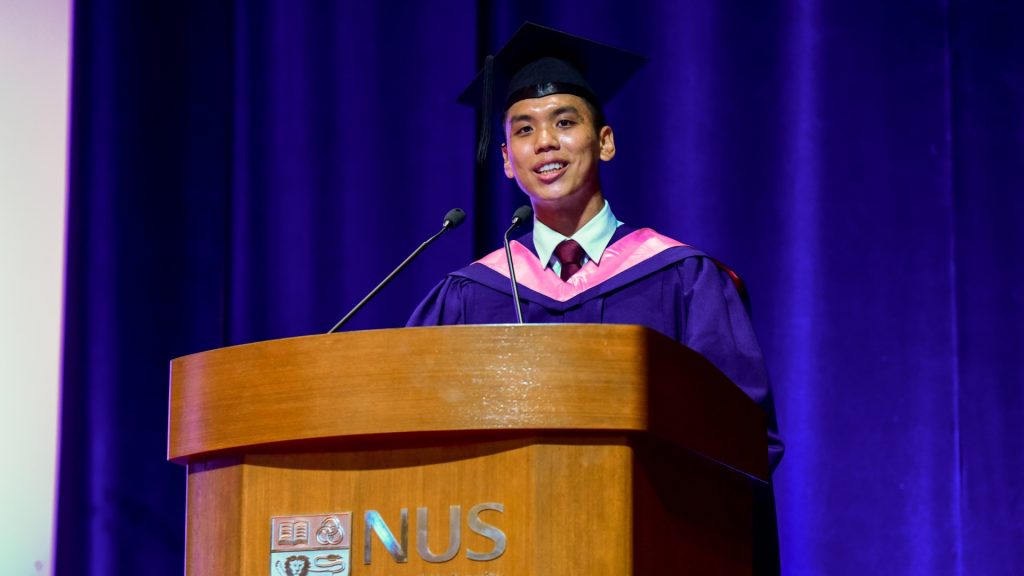
His words further summarised the spirit of determination and community that will carry graduates onwards in their lives: "If [the journey ahead] appears daunting to you, I say to you: fret not… because when you look to your left and your right, you see the resilient men and women who, forged by the challenges brought upon by the global pandemic, will always offer you a helping hand."
This story first appeared in NUSNews on 6 July 2022 as part of NUS News' coverage of Commencement 2022, which celebrates the achievements of our 13,975 graduates through 28 in-person ceremonies. For more on Commencement, look out for our upcoming graduate profiles, check out the official Commencement website, or look up (and tag) #NUS2022 and #NUSFASS on NUS' and FASS' social media channels!
New FCAB Training Curriculum for Frontline Officers and Volunteers Supporting Low-income in Singapore
IN BRIEF | 10 min read
- Developed by the Next Age Institute (NAI) with Citi Foundation’s funding, the new Financial Capability and Asset Building (FACB) training curriculum follows success of training programme for social workers rolled out in 2020.
- NAI’s plans to develop the SG FCAB-Frontline Training curriculum is supported by nine stakeholder-organisations. They are the Ministry of Social and Family Development, National Council of Social Service, MENDAKI, Singapore Prison Service, People’s Association, Institute for Financial Literacy, Singapore After-Care Association, Care Corner Singapore Ltd and AMKFSC Community Services Ltd.

The Next Age Institute (NAI) at the National University of Singapore (NUS) Faculty of Arts and Social Sciences (FASS) has embarked on an initiative to develop the Singapore Financial Capability and Asset Building (SG FCAB)-Frontline Training curriculum. The curriculum aims to equip frontline officers and volunteers from public, social services and community agencies with knowledge and skills to help low-income individuals and families improve their financial capabilities.
The development of the new SG FCAB-Frontline Training curriculum, which began in January 2022, follows the success of the SG FCAB-Social Work Training programme which was rolled out in 2020 by the Department of Social Work at NUS FASS to specifically train social workers and social work students to support the most financially vulnerable in Singapore.
NAI’s plans to develop the SG FCAB-Frontline Training curriculum is supported by nine stakeholder-organisations. They are the Ministry of Social and Family Development, National Council of Social Service, MENDAKI, Singapore Prison Service, People’s Association, Institute for Financial Literacy, Singapore After-Care Association, Care Corner Singapore Ltd and AMKFSC Community Services Ltd.
Citi Foundation, the philanthropic arm of Citigroup, has awarded a grant of US$330,000 towards the development of the SG FCAB-Frontline Training curriculum and the training of 200 more social workers in the SG FCAB-Social Work Training programme from January 2022 to June 2023. From 2017 to 2021, it had awarded grants totalling US$630,000 to develop and roll out the SG FCAB-Social Work Training programme that trained more than 250 social workers and more than 150 social work students to support the most financially vulnerable populations in Singapore.
Commenting on the SG FCAB initiative, Citi’s ASEAN Head and Citi Country Officer for Singapore, Mr Amol Gupte said, “The development of the new SG FCAB-Frontline Training curriculum marks another significant milestone in Citi’s 120 anniversary year in Singapore. Citi has been demonstrating its commitment to enable growth and progress in the community, and we are pleased to continue our financial inclusion efforts in supporting the vulnerable through the partnership with the NUS FASS Department of Social Work and the Next Age Institute.”
The plans for the new SG FCAB-Frontline Training curriculum and impact of the SG-FCAB Social Work Training programme were announced today at the “Financial Capability and Asset Building (FCAB): Maximising Potential, Empowering Communities” event organised by NAI and the NUS FASS Department of Social Work. Mr Masagos Zulkifli, Minister for Social and Family Development, and Second Minister for Health, attended the event as the Guest-of-Honour and delivered a speech which highlighted the importance of helping lower-income families to strengthen their financial management capabilities and how FCAB training could equip social workers, frontline staff and volunteers with the skills and knowledge to enable this.
Also speaking at the event, Associate Professor Chia Ngee Choon, Co-Director of NAI shared, “Together with social workers, frontline staff and volunteers play a crucial role in the overall help system. Low-income individuals and families who have worked through their social and financial vulnerabilities with the support of social workers, can continue to work with frontline staff and volunteers as part of the wider support system network to achieve their aspirations. With the SG FCAB-Frontline Training curriculum, frontline staff and volunteers will be equipped with the knowledge and skills to continue supporting low-income individuals and families to enhance their financial capabilities and asset building efforts.”
Adjunct Associate Professor Corinne Ghoh, SG FCAB-Frontline Project Lead at NAI highlighted that “instead of being prescriptive, FCAB principles emphasise the importance of listening, understanding, and building trusting relationships with recipients of help. This enables them to become more in control of their circumstances and helps them develop increased financial functioning to achieve their goals. When low-income individuals and families experience support in making informed decisions about their finances, they are empowered to assume greater control over their lives and move towards positive changes.”
The SG FCAB-Frontline Training CurriculumA nine-member Resource Committee chaired by NAI, which comprises representatives from the stakeholder-organisations was formed in April 2022. The Resource Committee will play a key role in providing guidance on the curriculum development and training of the sector.
NAI will also be conducting focus group discussions with frontline staff and volunteers who work with low-income individuals and families, to assess the training needs and identify gaps in practice.
It will also pilot the curriculum at the community level with 60 frontline staff and volunteers in the fourth quarter of 2022. The process of development, testing and refinement of the curriculum will be completed by June 2023. The aim is to institutionalise the SG FCAB-Frontline Training curriculum in the form of a programme as part of ongoing field learning and training for this group.

The SG FCAB-Social Work Training programme was offered from 2020 through the Continuing Professional Education arm of the NUS FASS Department of Social Work, with the curriculum developed by NAI from 2017 to 2019.
Associate Professor Esther Goh, Head of the Department of Social Work shared, “The success of the SG FCAB-Social Work Training programme is evident from the overwhelming response and positive feedback from SG FCAB-trained social workers who have enhanced their competencies in the area of financial social work. Aligned with the core values of social work, the SG FCAB-Social Work Training programme equips social workers with the knowledge and skills to actively engage clients in shaping their financial goals, harnessing their strengths to increase financial functioning and achieving sustainable financial outcomes.”
The plenary session at today’s event discussed the social innovations by social workers who went through the programme and how they applied FCAB principles to uplift lives and address financial challenges faced by their low-income clients.
Ms Grace Xu, Head of the Social Work Team at AWWA Transitional Shelter, who attended the SG FCAB training, said “I gained confidence and competency in navigating resources, shared benefits, and opportunities to enhance clients’ employability and strengthened their aspirations in achieving their financial goals.” Citing an example, she shared, “The knowledge of the Progressive Wage Model enabled me to better understand and support my client's efforts to improve his employability and eventually advance his employment prospects.”
This article first appeared in NUSNews on 17 June 2022.
NUS CHS Open House 2022: Discover #Interdisciplinary Education!
IN BRIEF | 5 min read
- The NUS College of Humanities and Sciences is hosting its Open House 2022 next week and all prospective students who have received offers are invited!
- A two-day hybrid programme – 11 May on Zoom (and viewable on CHS’ Facebook page) and 14 May on several locations across the NUS Kent Ridge campus, specifically the areas around the Faculty of Arts and Social Science (FASS), and the Faculty of Science (FoS) – CHS Open House 2022 aims to address all concerns a prospective undergraduate may have before committing to academic at the University and College.
- Highlights include opportunities to engage, discuss and explore academic pursuits, career development and student life at the College with key faculty and administrative staff and leadership — live and in person.
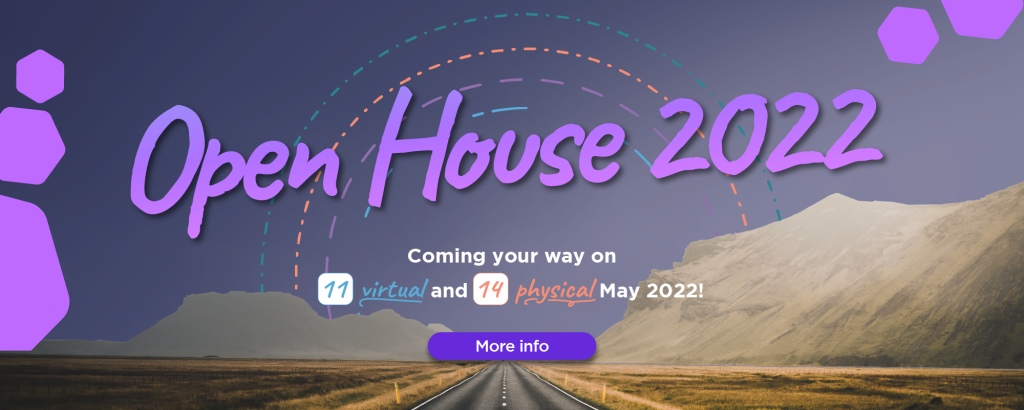
The NUS College of Humanities and Sciences is hosting its Open House 2022 next week and all prospective students who have received their offers are invited. As the deadline for them to accept their offers is looming, CHS has put together a programme aimed at answering all the questions they may have and clarifying all their concerns as much as possible.
Marking a cautiously calibrated return of the University to the normalcy of hosting large on-site events, this year’s CHS Open House is a two-day hybrid programme: 11 May on Zoom (and viewable on CHS’ Facebook page) and 14 May on several locations across the NUS Kent Ridge campus, specifically the areas around the Faculty of Arts and Social Science (FASS), and the Faculty of Science (FoS).*
11 May 2022 (Wednesday): The Essentials, OnlineThis a series of comprehensive information sessions (on Zoom and livestreamed on Facebook Live) covering everything new undergraduates need to know to get the most out of their education journey with CHS, including the:
- CHS Core Curriculum
- College’s three challenging but rewarding cross-disciplinary programmes
- Data Science and Economics (DSE-XDP)
- Environmental Studies (BES-XDP)
- Philosophy, Politics, and Economics (PPE-XDP)
- myriad Learning Pathways laid for you
- versatile career development programmes designed to prepare you for the future workplace
- CHS Student Experience—eye-opening and busy, yet energising and enriching
Speakers and panelists include CHS Co-Deans, Vice-Deans, key faculty staff members, career preparation and student services leader.
For more information and links to the 11 May sessions, click here.
14 May 2022 (Saturday): Get Personal, On CampusThe College is calling for prospective students to come on site, visit where they could well be spending their undergraduate years very soon, and speak to their future instructors and potential mentors. The full-day programme – running in key FASS and FoS locations across the NUS campus – offers:
- entry to witness and even participate in talks/lectures and panel discussions presented and hosted by award-winning instructors on a variety of academic subjects, interdisciplinary topics and specialised research areas
- face-to-face engagement with faculty, admin and student representatives from ALL Departments and student organisations under CHS, and opportunities to explore academic, financial aid and student activity options with the people in the know
- consultation with the career development teams of CHS
- guided Walking Tours across the facilities of FoS and FASS
For more information on the activities planned for 14 May, click here.
Discover Your #Interdisciplinary Future @ CHSThis Open House is the last chance for prospective students to learn more about the complete #interdisciplinary educational experience that they can expect at CHS. One that opens up a world of possibilities and equips them with skills and knowledge across the humanities, social sciences, physical sciences and applied sciences. One that inspires, cultivates and prepares them to work across diverse industries and sectors, with multidisciplinary teams, to solve some of the most complex wicked problems facing the world today — from social inequality to food shortage, unsustainable development and global warming. And one that grooms them to be the leaders of public institutions and private enterprise tomorrow.
* Campus shuttle bus services will be made available on 14 May to all visitors for easier movement across campus, which extends to Kent Ridge MRT.
Open House 2022 Engages and Excites
IN BRIEF | 30 min read
- The ever-popular NUS Open House hit new heights this year, attracting over 8.61 million visitors – a 26.2 per cent increase from the 6.83 million visitors that attended last year's online Open House.
- From 26 Feb to 5 Mar, visitors crowded the websites, livestreams, webinars and social media sessions hosted by the University's colleges, faculties and schools. There was something for everyone, and the event covered everything from academic courses to student life and entrepreneurship programmes.

The ever-popular NUS Open House hit new heights this year, attracting over 8.61 million visitors – a 26.2 per cent increase from the 6.83 million visitors that attended last year's online Open House.
From 26 Feb to 5 Mar, visitors crowded the websites, livestreams, webinars and social media sessions hosted by the University's colleges, faculties and schools. There was something for everyone, and the hybrid event covered everything from academic courses to student life and entrepreneurship programmes.
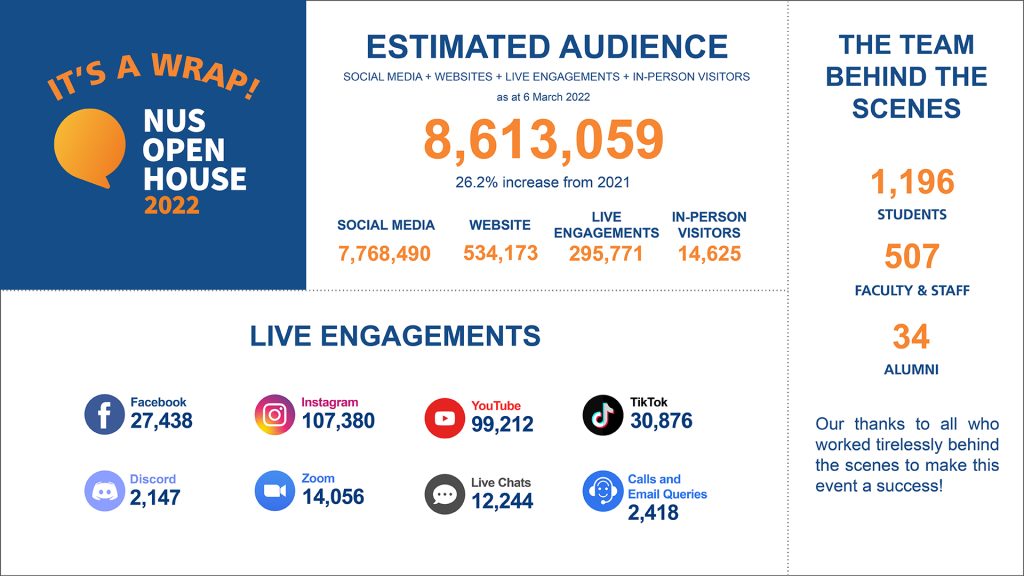
While much of the engagement happened online, prospective students got to meet NUS students and staff face-to-face for the first time since the pandemic started.
The physical Open House, held one sunny Saturday on 5 Mar, included numerous booths showcasing the University’s wide-ranging academic options and vibrant student life; sample classes and talks to get a taste of varsity life; and tours of the different colleges, faculties, and schools.
Prospective students gave the hybrid format a thumbs-up.
Joshua Chua, an alumnus of Anderson Serangoon Junior College, appreciated the online sessions and felt the physical Open House was a huge differentiating factor.
“The (physical) Open House really gave me a good image of what living and studying at NUS could look like by virtue of being an in-person event as opposed to it being virtual, so I'm really grateful to NUS and everyone involved for having this opportunity during the pandemic,” he said.
On her part, Hwa Chong Institution alumna Elsie Woo, who attended both the online and in-person sessions, said, “The experience was really welcoming and wholesome, and really exposed me to NUS as a whole.”
Showcasing the country’s first honours college
One of the highlights this year was the NUS College, Singapore’s first honours college. It will accept its first batch of students this year.
Prospective students were treated to online webinars on the College’s distinctive curriculum, its global pathways, and its focus on hands-on experiential learning. In more intimate breakout rooms, staff and student volunteers readily answered questions about student life and academic pathways. By having a home college or faculty – say Business or Science – while simultaneously being enrolled at NUS College, students will be able to get an educational experience that is as broad as it is deep.
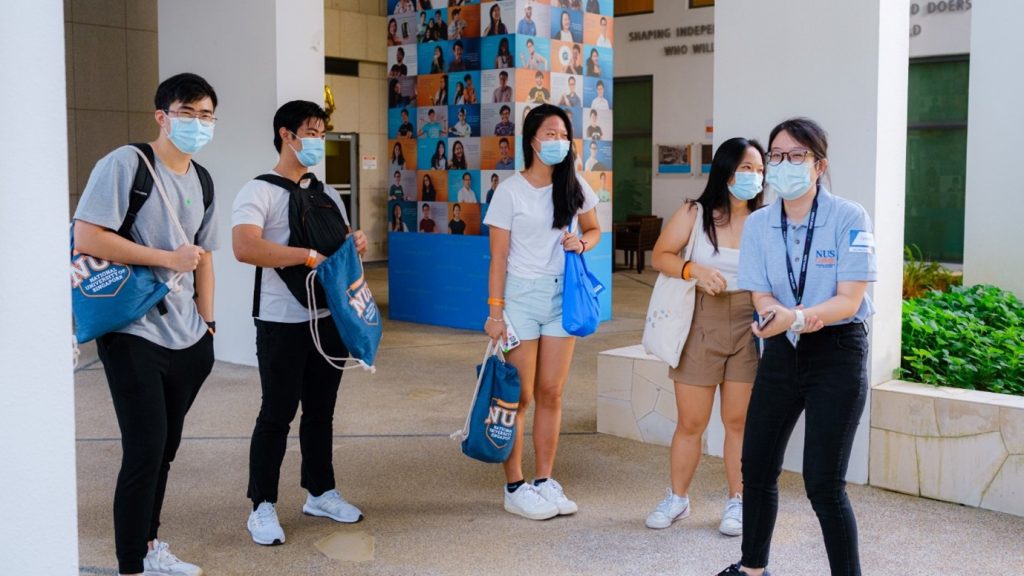
The in-person activities featured a tour of the facilities and residential options that NUS College students would be able to enjoy.
Elsie Woo was one of many students drawn to NUS College’s unique offerings.
“I attended a few webinars, including introductory talks for NUS College and Food Science and Technology,” said Elsie, who also visited many booths in-person.
“The sessions were very well-planned and the seniors were extremely helpful and patient.”
Nanyang Polytechnic alumnus Koh Jin Yuen focused his time on NUS College, attending the College’s guided tour and virtual sharing sessions.
“The NUS College tour was informative as I got to ask the facilitators about their experiences. I think the curriculum is very meaningful,” said Jin Yuen.
“The Open House helped to deepen my understanding of how NUS College works, and allowed me to better understand the lifestyle of a student from NUS College.” He is intending to apply for the Information Systems programme offered by NUS Computing, as well as NUS College.
Ramping up interdisciplinary offerings
Exciting developments in the realm of interdisciplinary education—a major theme that NUS has been championing—were foregrounded at the Open House, with the College of Design and Engineering (CDE) also taking in its inaugural cohort. A result of the merger of the Faculty of Engineering and the School of Design and Environment, CDE is set to transform the NUS educational experience.
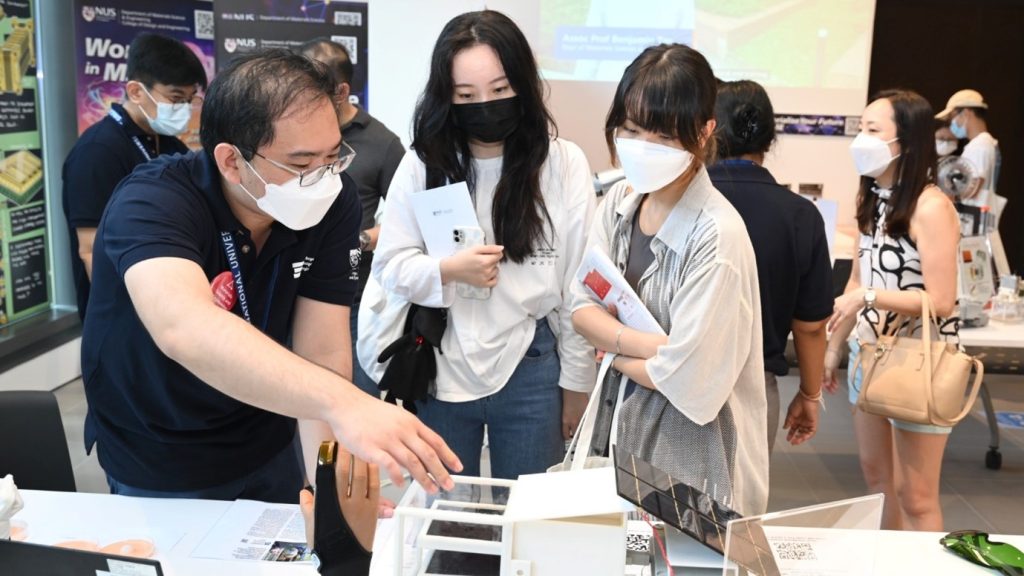
Across five galleries and 19 sub-categories, including Architecture, Industrial Design, Materials Science and Engineering, Biomedical Engineering, and Civil Engineering, visitors were presented with an informative display of the wide range of courses and programmes that will be on offer in the new College.
Raffles Institution alumna Grace Zai, who visited the Designing the Future exhibition and galleries, said, “The Engineering galleries were very informative as I could ask questions I had about the course, as well as student life, and get a clearer picture of what I would be studying and doing. It helped me make a more informed decision on my choices.”
Grace is considering applying to Engineering Science and Architecture, as well as Mechanical Engineering and Electrical Engineering with a specialisation in robotics.
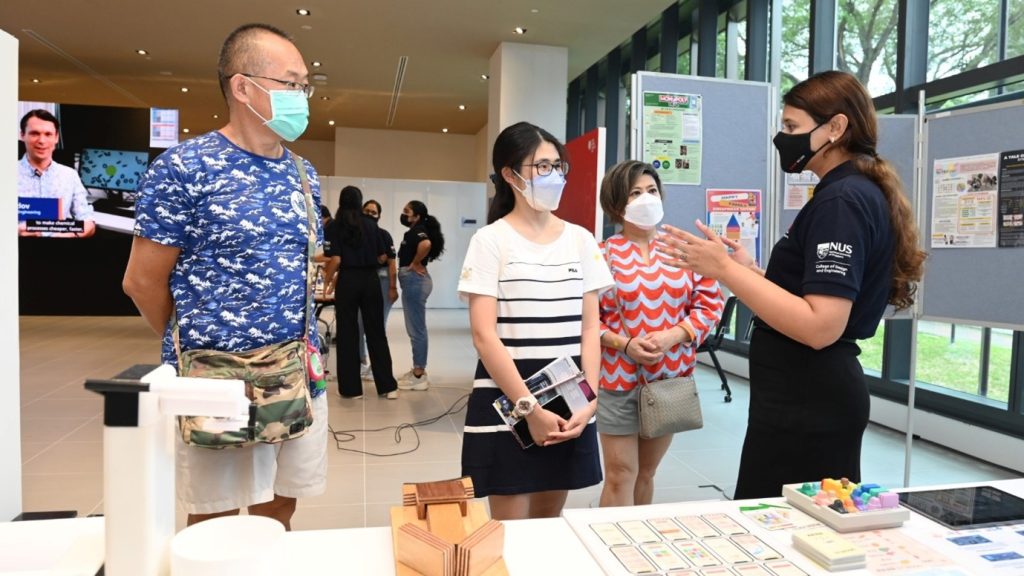
There were also panel discussions, both online and in-person, where faculty and current students interacted with prospective students to share their experiences and answer questions about the new interdisciplinary curriculum.
“As a prospective student, I got to see first-hand the school facilities, as well as the accommodations. My experience was pretty enriching and enlightening because I could ask the professors questions I had in mind and learn more about the courses,” said Timothy Tay, a graduate of Victoria Junior College who visited the SDE gallery on Sustainable Innovations.
“For example, I did not realise Project Facilities Management (PFM) was recently changed to Infrastructure Project Management (IPM). The professor explained that students will now graduate with a BEng degree rather than a BSc degree,” he recalled, referring to the first interdisciplinary full-time undergraduate programme to cover engineering, design, management, technology, building science and law modules.
Information was also available on the vibrant student life of the College’s various clubs and societies, as well as career programmes that enable students to better understand their interests and what it takes to marry that with industry skills and experience.
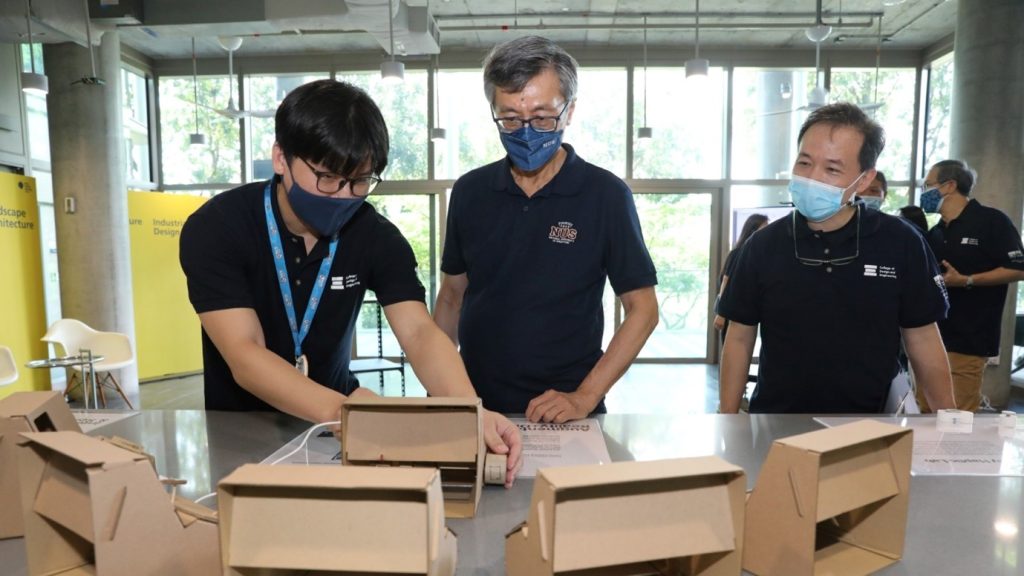
“The NUS Open House provided me with a more informed perspective on the courses offered in NUS. The various booths set up and run by students allowed for quick chats about what the courses have to offer. The responses by the students and professors were engaging and genuine, which I found informative in making my choice for courses in NUS,” said Kalepu Sai Sri Akshath, who attended CDE’s online and in-person events with his family and is intending to apply to Computer Engineering.
Drone-sensing demonstrations and the Solar Roof Tour, 5G Lab Tour, and BEEHUB Tour further showcased the College’s manifold facilities. Visitors also got a first-hand experience of NUS’ very own net-zero energy building through tours at SDE4, itself a product of both architecture and engineering, and the first of its kind in Singapore.
A marriage of the humanities and sciences
Continuing in the vein of interdisciplinarity and equipping students with a multifaceted, integrated toolbox of skills to thrive in the future economy is the College of Humanities and Sciences (CHS), which will be accepting its second intake this year.
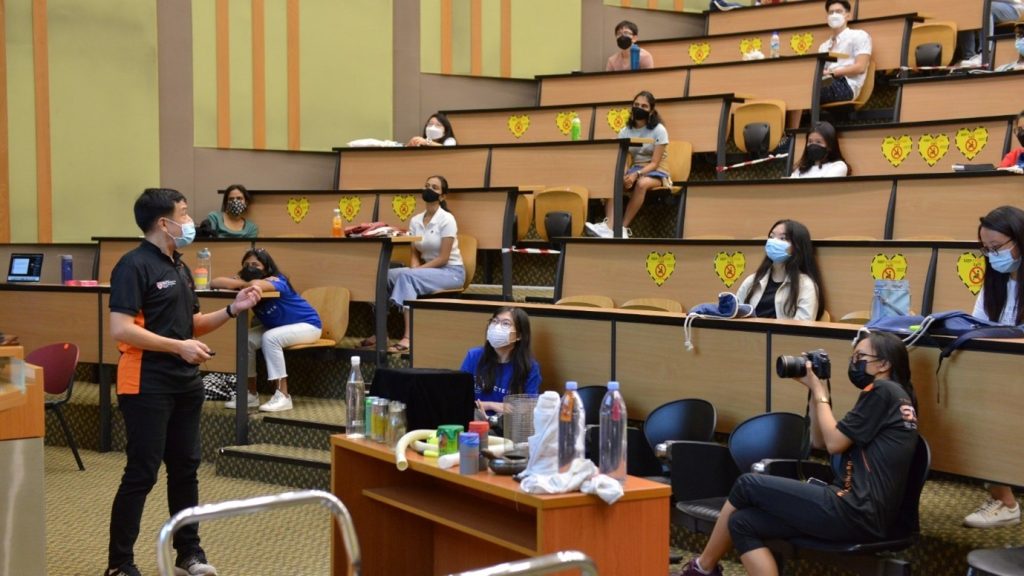
Seminars about the CHS Core Curriculum were available at the Open House, as well as informative masterclasses that covered a vast range of interdisciplinary topics.
The Data Science and Economics masterclass saw Assoc Prof Lim Tiong Wee and Assoc Prof Chen Ying (Statistics & Data Science, Faculty of Science) and Dr Denis Tkachenko (Faculty of Arts and Social Sciences) break down the complexities of the digital economy with real-life examples, and explicate its relevance to Singapore’s Smart Nation goals.
The new Data Science and Economics (DSE) cross-disciplinary programme will be the first of its kind in Singapore to integrate knowledge across these two disciplines.
“I got to understand how data science and economics complement each other,” said Russell Hor, a graduate of St. Joseph's Institution who has finished National Service and is enrolling in CHS this year.
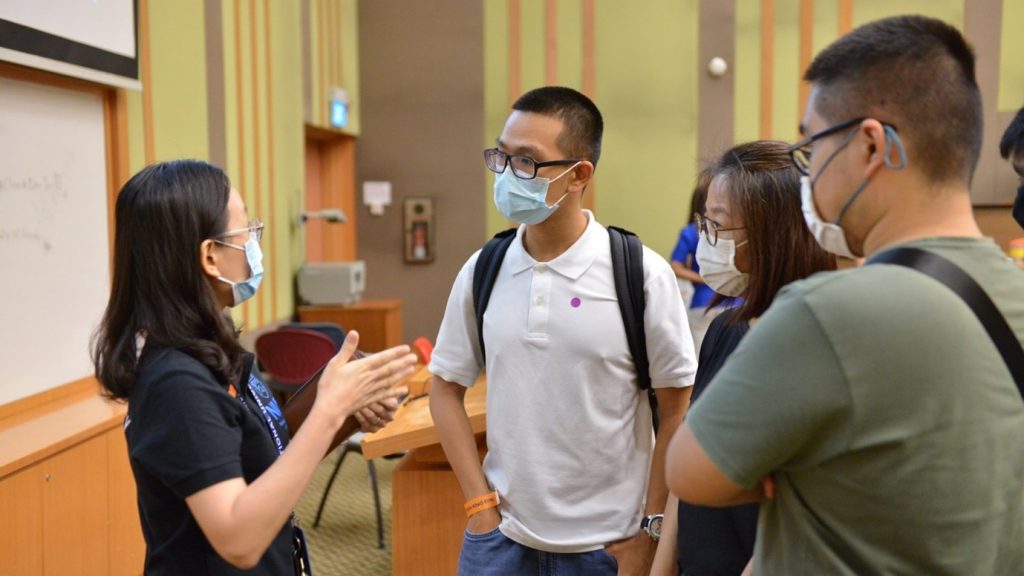
Vanille Goh, who graduated from Anglo-Chinese Junior College and attended the Geography and Environmental Studies masterclasses, said, “[The masterclasses] provided me with a good overview of how passionate the lecturers were and how each course will adequately prepare me for what I would want to do in the future.”
Nanyang Junior College alumna Wen Xinyue also appreciated the in-person masterclasses, adding that they gave her a first-hand glimpse into studying humanities at the university level.
“I am interested in studying English, and from the English Language and Literature masterclass on Gender, Sexuality and Language, I learnt about how entrenched gender roles and stereotypes can be within the language we use,” she shared.
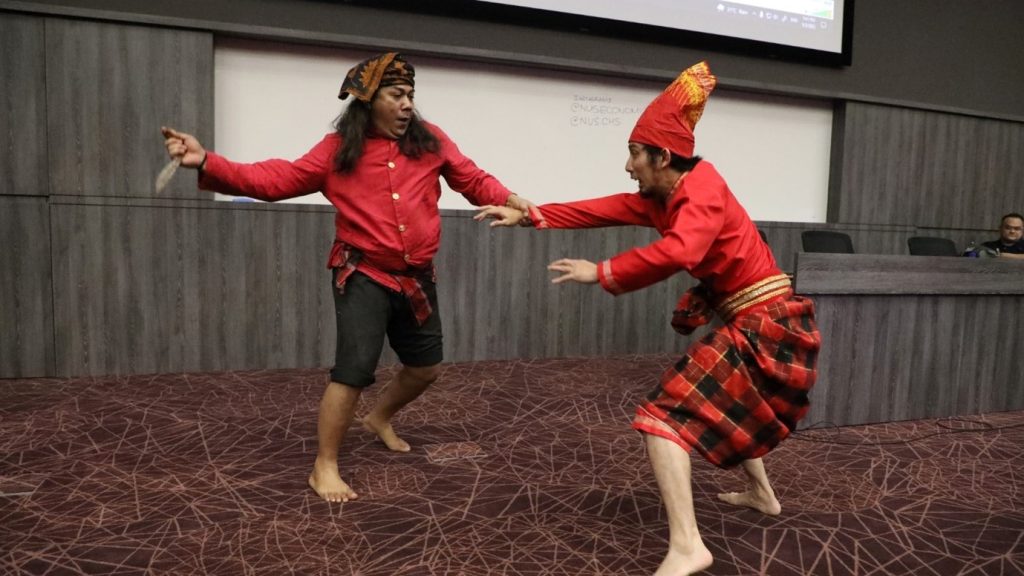
Meanwhile, over at the “Insights into Southeast Asia from the Martial Arts Perspective” masterclass, Dr Mohamed Effendy of NUS Southeast Asian Studies presented prospective students with a riveting intellectual and visual treat, demonstrating how useful unique perspectives on the region’s myriad communities can be gleaned by studying them through the lens of the martial arts. Students saw the concepts brought to life – witnessing first-hand an exciting live demonstration by practitioners of pencak silat – of how Southeast Asian warriors of old defended themselves using a wide array of techniques and weapons.
Action aplenty
There was action aplenty among other faculties. NUS Business School’s programmes included a 360 live tour, as well as live chats with the BBA Deans on the different majors offered by the School. Its in-person sessions included sharing sessions by the BBA Deans, BIZCareers advisors, and student ambassadors.
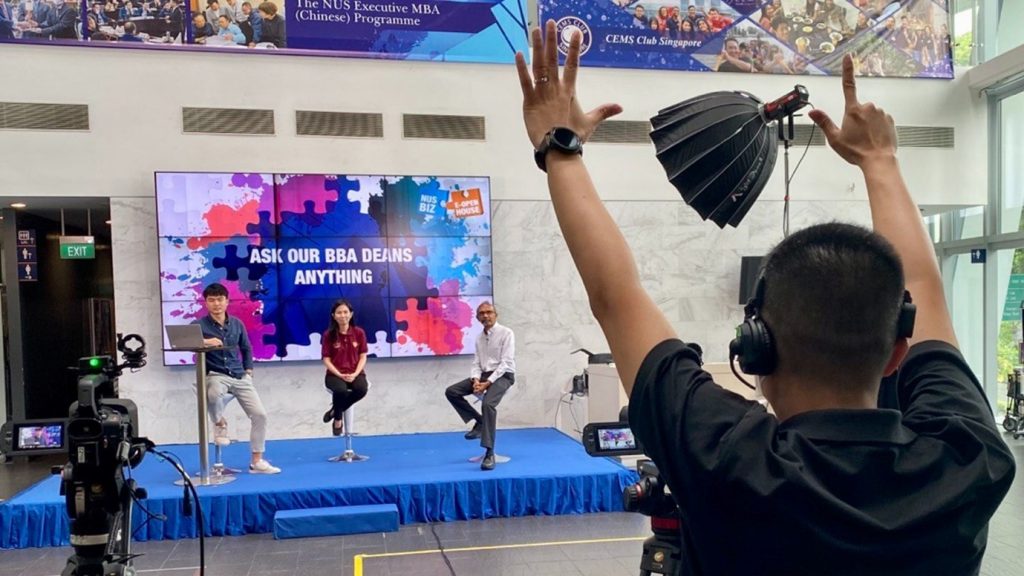
Year 4 Accountancy and Finance undergraduate Calvin Chur was one such student volunteer, serving as an emcee for the online Open House and sharing in-person on 5 Mar about life at the Business School.
“It was a tiring, but extremely fulfilling day engaging with prospective students, learning about their concerns with regards to entering a new phase of life and trying to address those concerns,” said Calvin. “In fact, many of their concerns mirrored those that I had as a fresh A-level graduate attending the NUS Open House back in 2016 – and I am glad that I could offer insider insights to help them make an informed decision at this major milestone of their lives.”
Year 4 Real Estate undergraduate Natasha Liem, another student volunteer who served as an emcee, added, “There was quite a large number of viewers for the panel and a prospective student actually sent me a message on Instagram to enquire more about real estate from a student's perspective. I think the panel went well!”
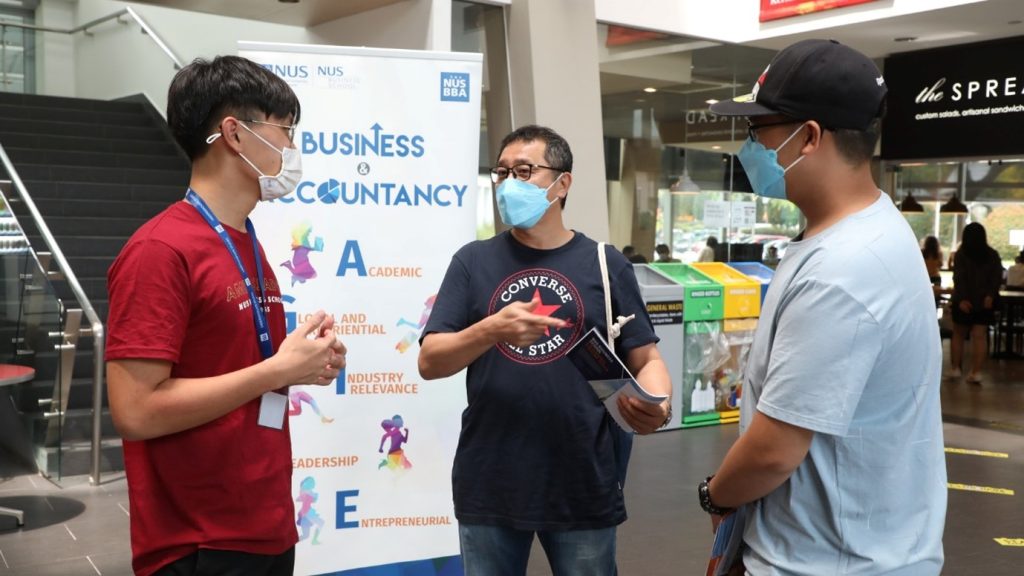
For NUS Business School Executive (Marketing & Outreach) Ms Casey Jean Grant, it was an eye-opener to experience the whole planning process.
“Most of the students and parents were very curious and excited about the prospect of coming to NUS Business School,” she added. “Their excitement definitely rubbed off on us and made the rest of us excited to share about our School.”
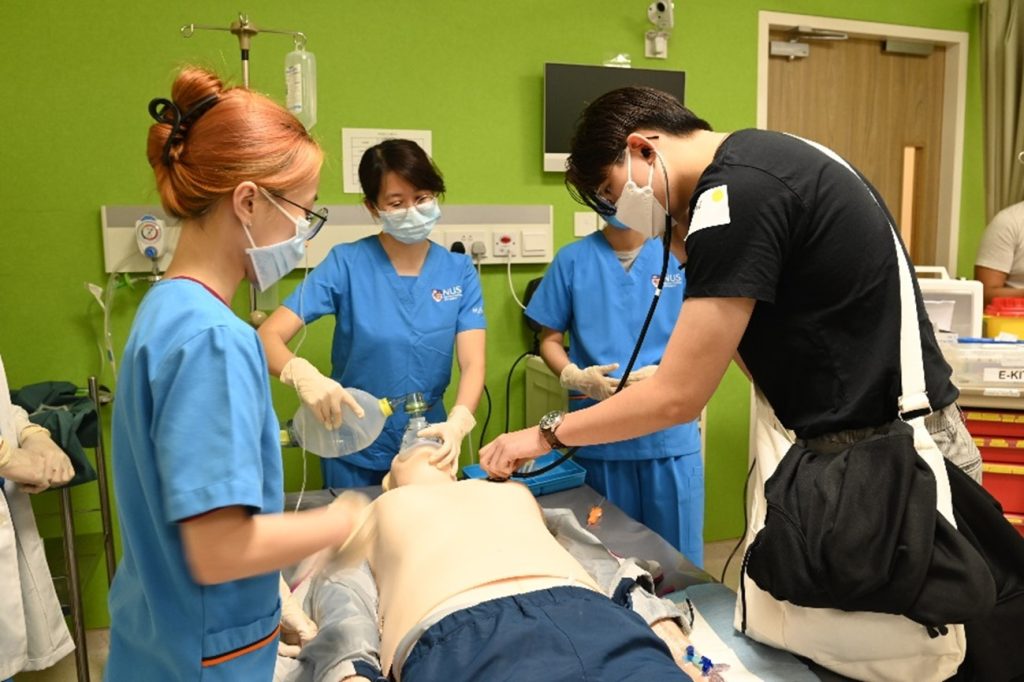
With frontline healthcare workers being in the spotlight these couple of years, there was plenty of interest in NUS Dentistry, NUS Nursing, NUS Medicine, and Duke-NUS Medical School. Live demonstrations were conducted and prospective students got a taste of what it would be like to be a dentist, nurse or doctor.
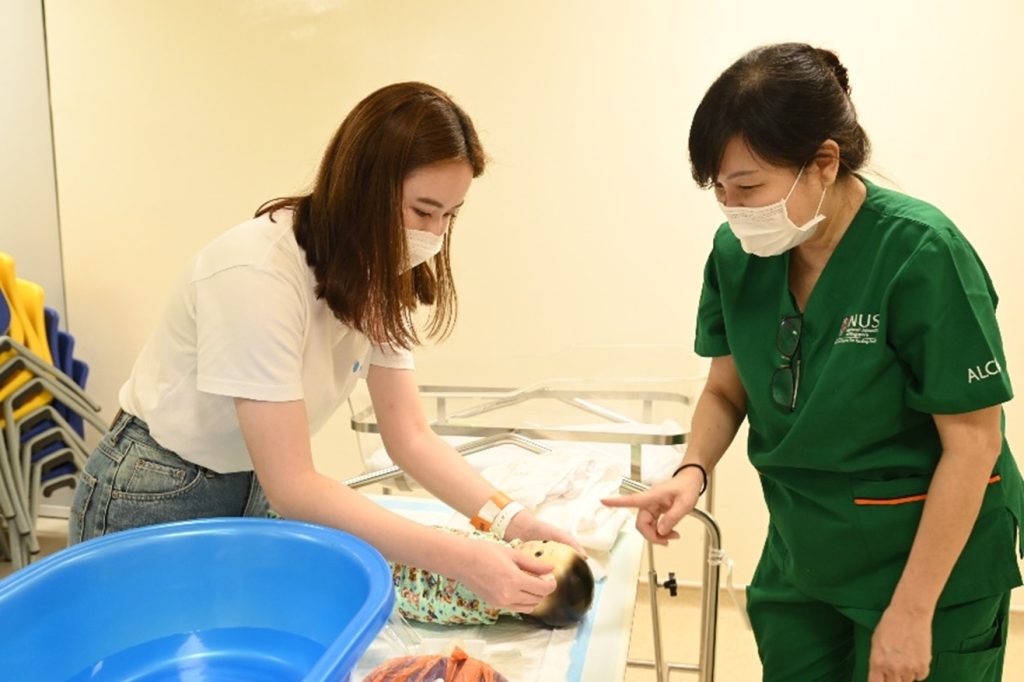
Serving up a slice of campus life
Whether on the screen or in the flesh, visitors to the Open House also witnessed the rich and vibrant student life beyond the classroom that NUS is known for.

Besides holding talks to acquaint visitors with the wide range of co-curricular activities available, student clubs and societies rose to the occasion at the Student Village showcases to feature a spectacular smorgasbord of music, dance and sporting performance across the eight days that Open House was on. Visitors were serenaded by soulful tunes by the NUS Jazz Band and wowed by the moves of NUS Kendo Club. They were also treated to cheerleading displays, snazzy dance performances by NUS Funkstyle and BreakiNUS, catchy renditions of contemporary pop and choral music by the a cappella group Resonance, and the dulcet tones of TheNUSChoir and the NUS Mandopop group Voices.
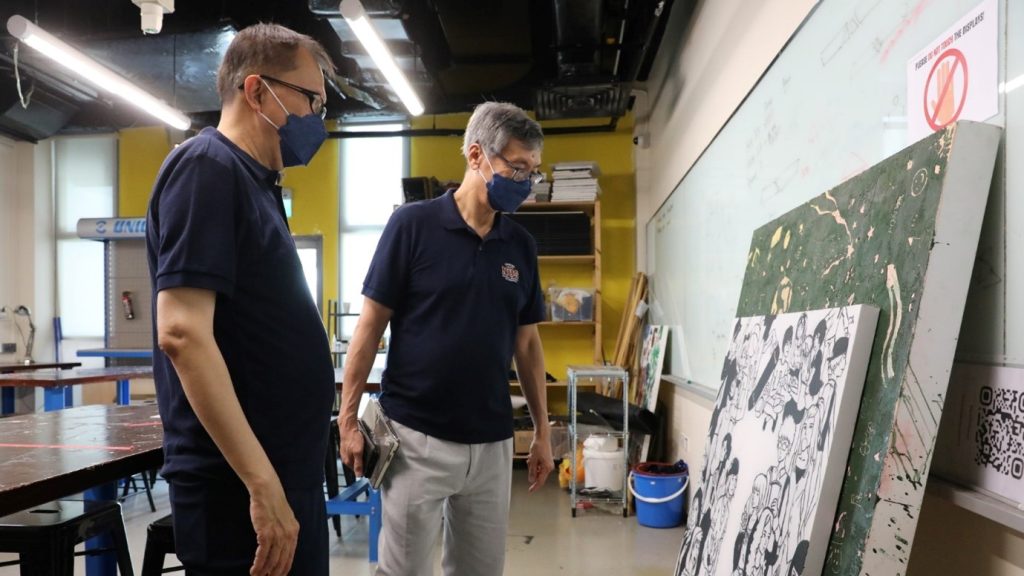
"It was really lively with dozens of booths as well as live performances put on by really talented students! It truly allowed me to understand the culture here and makes me want to be a part of it after experiencing first hand,” Vanille Goh shared.
Students and hall masters from the halls and residences also conducted informative residential life talks, A-Day-in-the-Life-Of vlog sessions and Ask-Me-Anything sessions to help students interested in on-campus living understand its manifold aspects like academic programmes and pastoral care.
These were complemented by in-person tours of King Edward VII Hall, NUS College, Ridge View Residential College, Tembusu College, RC4, and Pioneer House, NUS’ newest housing model, giving participants a real taste of the sense of community and camaraderie that comes with residential life in NUS.
Joshua Chua, who also participated in the RC4 tour, said, “The RC4 tour was definitely a highlight because the tour guide, as with most staff and students, was welcoming and frank, which eased my nervousness.”
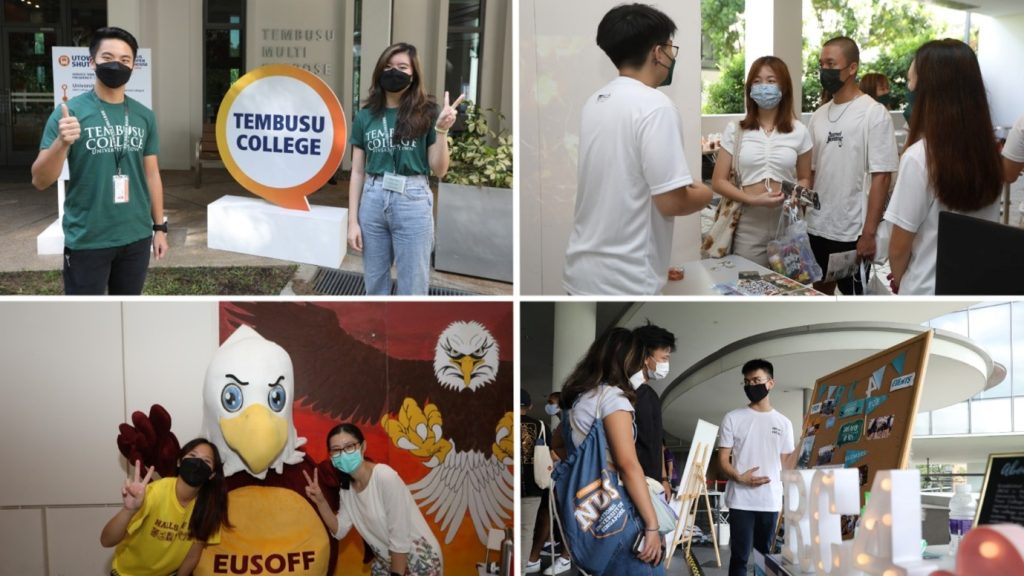
Matthew Yeow, an alumnus of Anglo-Chinese School (Independent) who attended both online and in-person sharing sessions by student residents of the Residential Colleges, said, “During the physical Open House, I had the opportunity to find out a lot more about the residential colleges and what made them distinct from halls. Furthermore, I also got to find out more about the individual residential colleges and their communities, as well as the additional modules they took.”
“As a prospective student, I think the Open House was executed effectively through both the online and physical mediums. Having the opportunity to come down and visit the University and talk to the current students gave me a better understanding of student life in NUS,” he added.

This story first appeared on NUSNews on 8 March 2022.
New Courses for the New Economy
IN BRIEF | 5 min read
- NUS is offering a number of new programmes to prepare graduates for the future, including the much-anticipated Major in Anthropology, and Minor in Interpreting by the NUS Department of Chinese Studies.
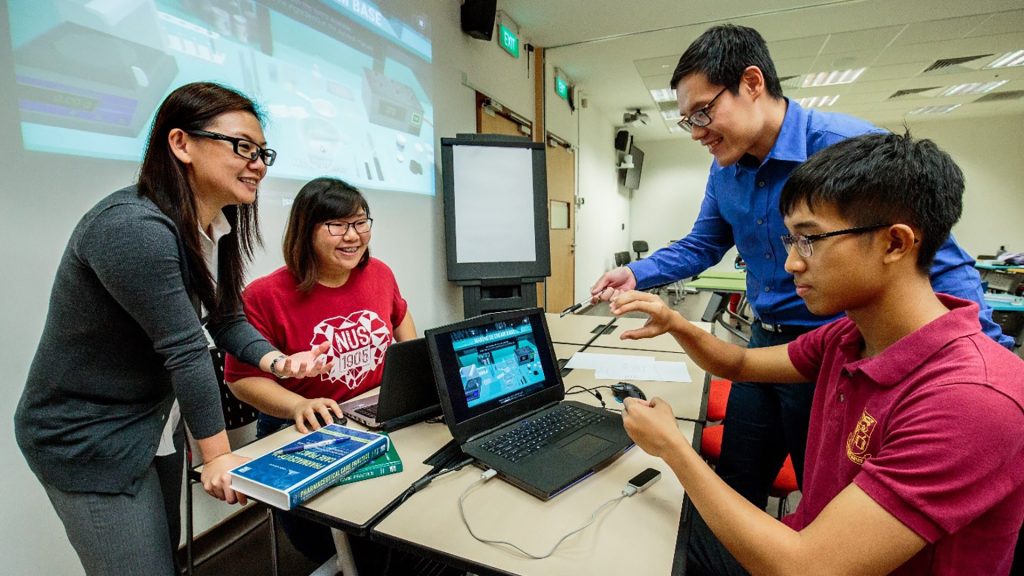
The University’s key theme of preparing undergraduates for the workplace of the future will be further enhanced with the launch of new majors, minors and degree specialisations in the upcoming academic year. About 10 new courses are on the cards.
New programmes from the NUS College of Design and Engineering (CDE), NUS Faculty of Science, NUS School of Computing, and NUS Faculty of Arts and Social Sciences will cover areas such as Artificial Intelligence, technology, data science, sustainability, globalisation. They will add on to the interdisciplinary offerings by the flagship NUS College, Singapore’s first honours college welcoming its first cohort in August – as well as those by the College of Humanities and Sciences (CHS).
“The overall goal of all our education reform efforts is to advance a university curriculum that prepares students well for a Fourth Industrial Revolution world and workplace,” said Professor Bernard Tan, NUS Senior Vice Provost (Undergraduate Education).
“Our education, focused on both breadth and depth, ensures that our graduates are held in high regard by employers. Last year, more than nine in 10 NUS graduates secured a job within six months of their final examinations.”
New majors and minors
Bachelor of Engineering (Infrastructure and Project Management)Offered by CDE’s Department of the Built Environment, this degree will equip graduates with the knowledge and interdisciplinary skills to excel in the multifaceted built environment. This is the first interdisciplinary full-time undergraduate programme to cover engineering, design, management, technology, building science and law modules. Major in Anthropology
Offered by the NUS Faculty of Arts and Social Sciences to all CHS students, this major will study the range of human diversity, accounting for how people in different times and places have developed into distinctly different societies. The degree will expose students to a vast variety of different beliefs and health practices, economic and political systems, material culture, and even different notions of beauty, the environment, food, family, and the good life.
Anthropology is much sought after for the sort of training it offers its students – a ground up approach to developing deep understanding on just about every aspect of the human condition. Students will be equipped to better understand and deal with the chaos, uncertainty, and ambiguity that characterises the contemporary age.
Second Major in Sustainable Urban DevelopmentOffered by CDE’s Department of Civil and Environmental Engineering, it aims to train the next generation of urban problem-solvers. They will be equipped with interdisciplinary knowledge and skills to create sustainable urban environments in the context of the changing climate. Open to all NUS undergraduate students, this major is stackable to students’ primary major in their chosen field, and can be completed in four years with no additional academic workload. Second Major in Nutrition
This will be offered by the Faculty of Science to all CHS students, including those reading Food Science and Technology as the primary major. It is designed to equip students with knowledge in human nutrition, providing them with the necessary foundation to develop a cross-disciplinary perspective along the food supply chain – from farm to fork to health. Minor in Interpreting
Multilingualism is a defining characteristic of Singapore’s multi-ethnic, immigrant society. With four official languages and with English as the working language, translating and interpreting between each of the mother tongues and English has always been a prominent feature of Singapore society. Against this backdrop, the NUS Department of Chinese Studies has placed as one of its core objectives, the training of graduates with strong Chinese-English bilingual skills who can become leaders in the translation and interpreting arenas.
This new Minor will allow students a related alternative to translation, or as an affiliated Minor to Translation which is already being offered at the Department.
New specialisations
Three new specialisations will be offered by the NUS School of Computing:
Specialisation in Digital Product and Platform ManagementThis will be offered to students pursuing the Bachelor of Computing (Information Systems) Degree. They will build up a repertoire of knowledge and skills sought after by both technology companies and the digital immigrant companies that are fast adopting the product- and platform-centric technology and business operating models. Specialisation in Intelligent Systems Solutioning
Students pursuing the Bachelor of Computing (Information Systems) Degree can also take this new specialisation to learn to implement and apply intelligent system solutions buttressed by the new technologies of Artificial Intelligence, the Internet of Things, and Augmented Reality. They will learn to apply these new technologies in software engineering, and to implement and manage intelligent system solutions. Graduates will be able to take on job roles in intelligent systems engineering and solutioning. Specialisation in Machine Learning-based Analytics
This new specialisation for Bachelor of Science (Business Analytics) students will enable students to tap into the analytics capabilities of Machine Learning, a sub-field of Artificial Intelligence. They will learn to rapidly and automatically develop models that can quickly and accurately analyse massive, complex data sets, in order to help businesses unlock the value of corporate and customer data and enact decisions that keep them ahead of the competition. Graduates will be able to take on careers in the rapidly-growing business and data analytics field, among others.
New modules
Aside from the new majors, minors and specialisations, a number of new modules are being offered. For instance, the NUS School of Computing is starting a Digital Ethics and Data Privacy module to educate students on this pertinent and pressing issue.
The NUS Faculty of Law is introducing two modules – one on Law & Technology and one on Data Literacy – as technology and data are increasingly being key drivers for the legal industry.
Find out more about the courses offered by the University, and explore this year’s Open House. Here are four things to look out for at the Open House.
This story first appeared on NUSNews on 24 February 2022.
NUS Open House 2022: Interdisciplinary Offerings, In-person Activities and More!
IN BRIEF | 5 min read
- NUS Open House 2022 is back with opportunities for prospective students to meet NUS professors, students and alumni face-to-face, after two years of connecting virtually.
- Running from 26 February through 5 March, NUS Open House 2022 will begin with a comprehensive line-up of informative activities, including the online segment, during the week leading up to the physical Open House, which takes place on Saturday, 5 March from 9 am to 7 pm across NUS’ campuses in Kent Ridge and Bukit Timah.

NUS Open House 2022 is back with opportunities for prospective students to meet NUS professors, students and alumni face-to-face, after two years of connecting virtually.
The physical event will take place on Sat, 5 Mar from 9am to 7pm across NUS’ campuses in Kent Ridge and Bukit Timah. This will be preceded by a comprehensive line-up of informative activities during the week leading up to the physical Open House.
Including the online segment, NUS Open House 2022 takes place from 26 Feb to 5 Mar. Here’s a heads-up on four things to check out:
1. Exciting interdisciplinary offerings
NUS College, Singapore’s first honours college, was formed by the merger of the University Scholars Programme and Yale-NUS College. Offering an immersive, experiential and interdisciplinary educational journey, it will welcome its first batch of students this year. Students will have a home college or faculty, say, Business or Engineering, while simultaneously being enrolled at NUS College. There, they will have the opportunity to enjoy a holistic interdisciplinary curriculum that is complementary to their major.
Another option for interdisciplinary learning can be found at NUS College of Design and Engineering. The College offers a programme that prepares students for the future through interdisciplinary learning and robust research in the fields of engineering and design. At the College, students are given the flexibility to build and design their own learning experience.
The NUS College of Humanities and Sciences, the enhanced undergraduate experience for students of the Faculty of Arts & Social Sciences and the Faculty of Science, is accepting its second intake this year. The College offers 13 Common Curriculum pillars consisting of modules such as scientific inquiry, humanities, digital literacy, design thinking, artificial intelligence and many more exciting options. These are complemented by majors and minors spanning the arts, humanities and sciences, such as global studies, philosophy, theatre and performance studies, quantitative finance, data analytics and pharmaceutical science. Students can pick and choose modules to create a customised curriculum that matches their interest and aspirations.
To ensure that graduates are ready to take on leading roles in the New Economy, NUS constantly develops new courses. Here are this year's new offerings.

2. Meeting you in person - again
After two years of meeting virtually, the NUS community is excited to get together in real life with prospective students once again!
You can look forward to an enlightening schedule of in-person activities including a tour of the Centre for Healthcare Simulation by NUS Nursing; tours of residential living options such as Tembusu College, CAPT (College of Alice & Peter Tan), and RC4; a live demonstration of a moot court session and tour of the NUS Bukit Timah campus by NUS Law; tours and a showcase of NUS College; as well as a live question-and-answer session with Duke-NUS Medical School.
3. Webinars, talks, live chats, hotlines and more
Get a taste of life as an NUS student, even before the physical event. A host of insightful webinars, talks, question-and-answer sessions, live chats, hotlines, and virtual tours have been arranged starting 26 Feb to give you a head start on topics such as admissions, student life, and on-campus living, as well as programmes offered by NUS College, the College of Design and Engineering, the College of Humanities and Sciences, Business, Music and many more.
Obtain behind-the-scenes knowledge from NUS student ambassadors and the NUS Students’ Union on the rich student life available at NUS, and be serenaded by NUS Choir and NUS Jazz Band.
Professors will be on hand to share information on their respective programmes, and you’ll even have a chance to sit in on classes. Have a question that is not covered by the briefing? No sweat! There’ll be chat sessions with NUS Admissions, professors and students from selected programmes during which you can get your queries addressed.
Click here for the list of virtual and in-person activities for NUS Open House.

4. Exciting student life
NUS offers a myriad options for a rich student life, and NUS Open House is the perfect place to start exploring the possibilities. Many alumni recall their NUS days fondly, remembering not only the academic progress they made, but the camaraderie forged with friends from clubs, societies and on-campus residences.
Throughout the period of the online Open House and during the physical event, representatives from various student-led groups will speak on topics including hall life, clubs and societies, as well as campus performing groups. Take part in a live session with music and dance groups, embark on a virtual residential tour, and more.
We’re looking forward to seeing you online from 26 Feb and in-person on 5 Mar!
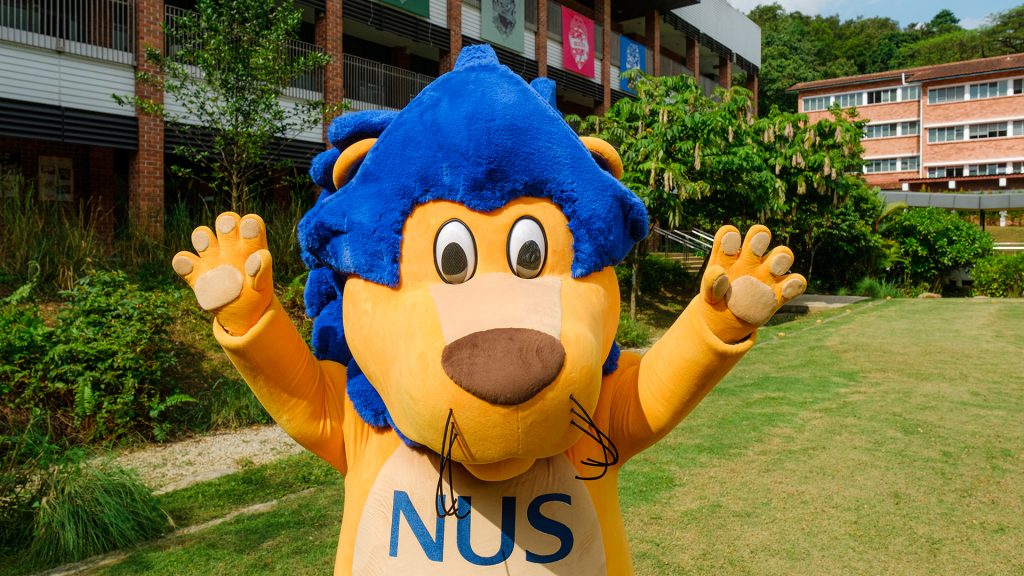
This story first appeared on NUSNews on 23 February 2022.
FASS Inspiring Mentor 2021 Award Winners Announced

The NUS Faculty of Arts and Social Sciences is proud to announce the winners of the 2021 FASS Inspiring Mentor Awards.
Congratulations to:
- Prof Jack Qiu Linchuan, Professor, Department of Communications and New Media
- Assoc Prof Loy Hui Chieh, Associate Professor, Department of Philosophy
- Assoc Prof Robin Loon Seong Yun, Associate Professor, Department of English Language and Literature
- Dr Michael Yoshitaka Erlewine, Assistant Professor, Department of English Language and Literature
- Dr Nina Laurel Powell, Senior Lecturer, Department of Psychology
Winners of AY2020-21 Faculty Teaching Excellence Awards Unveiled
 The NUS Faculty of Arts and Social Sciences is proud to announce the 37 winners of the Faculty Teaching Excellence Award for their work in AY2020‐21, 16 of which have also been nominated for the Annual Teaching Excellence Award(ATEA) and Annual Digital Education Award (ADEA).
The NUS Faculty of Arts and Social Sciences is proud to announce the 37 winners of the Faculty Teaching Excellence Award for their work in AY2020‐21, 16 of which have also been nominated for the Annual Teaching Excellence Award(ATEA) and Annual Digital Education Award (ADEA).
Special thanks are due to members of the Faculty Teaching Excellence Committee–Dr Susan Ang (English Language and Literature and Chair of FTEC), A/P Loy Hui Chieh (Philosophy; FASS Vice‐Dean), A/P Lim Wee Hun, Stephen (Psychology), Dr Gilbert Yeoh (English Language and Literature) and Mrs Chen Ing Ru (Centre for Language Studies)–for their efforts in shortlisting and nominating the winners.
|
NAME |
DEPARTMENT |
|
Mr Appriou Yannick Francois |
Centre for Language Studies |
|
Ms Baranska, Malwina |
Centre for Language Studies |
|
Ms Klayklueng, Sasiwimol |
Centre for Language Studies |
|
Ms Morita, Kazuko |
Centre for Language Studies |
|
Dr Chaidaroon Suwichit |
Communications and New Media |
|
Dr Hong Renyi |
Communications and New Media |
|
Dr Mitchell, Alexander Ian |
Communications and New Media |
|
Dr Shobha Avadhani |
Communications and New Media |
|
Mr Tan Kai En |
Communications and New Media |
|
Dr Timothy Wong Chong Ji |
Economics |
|
Dr Vu Thanh Hai |
Economics |
|
A/P Michelle M. Lazar |
English Language & Literature |
|
Dr Miguel Escobar Varela |
English Language & Literature |
|
A/P Starr Rebecca Lurie |
English Language & Literature |
|
A/P Thell Anne Marie |
English Language & Literature |
|
Dr Roy, Tania |
English Language & Literature |
|
A/P Chang Tou Chuang |
Geography |
|
A/P Daniel Adam Friess |
Geography |
|
Dr Gretchen Christina Coffman |
Geography |
|
Dr Kamalini Ramdas |
Geography |
|
Dr Kenney-Lazar Miles Richard |
Geography |
|
Dr Teo Sheng Kiat, Shaun |
Geography |
|
Dr Donna Maree Brunero |
History |
|
Dr Lawrence, Kelvin |
History |
|
Dr Sayaka Chatani |
History |
|
Dr Beddor, Robert Speeter |
Philosophy |
|
Prof Bain, William Ward |
Political Science |
|
Dr Dunya Deniz Lepori |
Political Science |
|
Dr Jia Lile |
Psychology |
|
Dr Nina Laurel Powell |
Psychology |
|
Dr Wong Shi Hui Sarah |
Psychology |
|
Dr Peace Wong Yuh Ju |
Social Work |
|
Dr Chua Hui Ching, Emily |
Sociology |
|
Dr Elliott Edward Prasse-Freeman |
Sociology |
|
Dr Jennifer Emily Estes |
Sociology |
|
Dr Noorman Abdullah |
Sociology |
|
Dr Radics, George Baylon |
Sociology |
Congratulations to them all!
FASS Announces New Additions to Leadership Team
IN BRIEF | 2 min read
The NUS Faculty of Arts and Social Sciences is pleased to announce recent new appointments to the Faculty's leadership team.
Three eminent members of the Faculty received new appointments to the Deanery at the beginning of this year:
- Professor Joseph Park (English Language and Literature)
Vice-Dean (Undergraduate Studies) - Dr Zhang Yang (Economics)
Associate Dean (Undergraduate Studies) - Dr Noorman Abdullah (Sociology)
Assistant Dean (External Relations and Student Life)
We wish them the very best with their new portfolios. Click here to visit the FASS Deanery page.




NUS Bags Major PR Award for College of Humanities and Sciences Campaign

One year since the official inauguration of the NUS College of Humanities and Sciences (CHS), the publicity campaign for the new College has gained recognition at the recent Public Relations in the Service of Mankind (PRISM) Awards.
The University bagged a Distinction Award in the category “Outstanding Campaign by a Non-Government Organisation or Not-For-Profit Organisation” for the launch and publicity of the interdisciplinary College.
The award recognises NUS’ effective communications regarding the necessity of an interdisciplinary education to faculty members, prospective students and their parents, alumni, employers, and members of the public.
The campaign also underscored what CHS offers students in a world plagued by complex challenges that require integrated interdisciplinary approaches. The campaign included the launch event, student profiles, social media, and CHS collaterals and media assets in the form of CHS-specific infographics, news and FAQs.
The campaign also included a video series on interdisciplinarity, a podcast series by the teaching team of the common curriculum Humanities module, and stakeholder endorsement in the form of testimonials from students and alumni of NUS Faculty of Arts and Social Sciences (FASS) and the NUS Faculty of Science (FoS) who have pursued interdisciplinary studies. A successful admissions publicity campaign was run, including the 2021 NUS Open House which drummed up interest in the College with student and employer panels, small group tours, and student chat rooms.
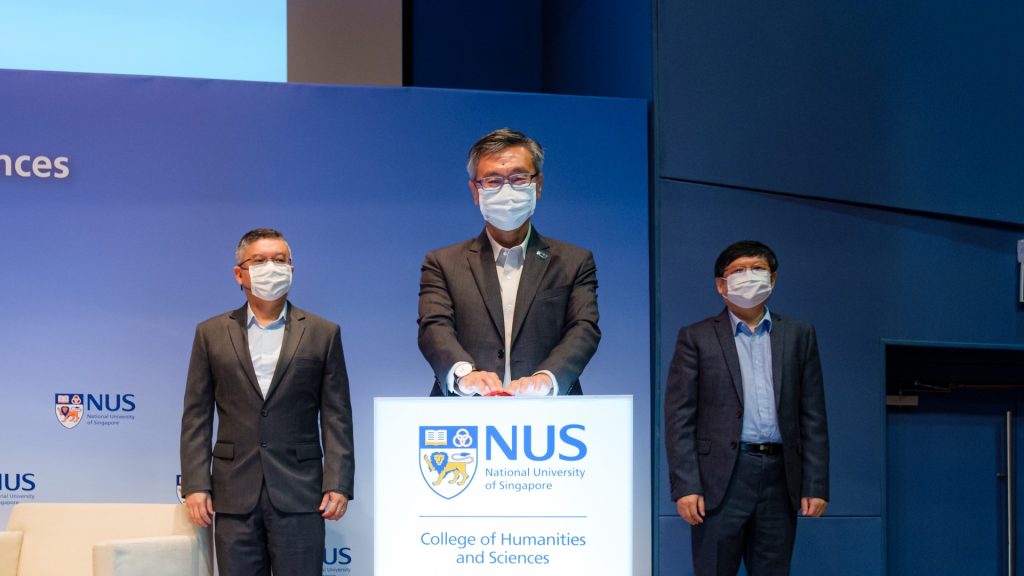
The accolade from PRISM, which coincides with the one-year anniversary of the official inauguration of CHS, bears testament to the concerted effort on multiple fronts of the campaign by various stakeholders, including the Communications teams from FASS and FoS, the NUS Office of University Communications and communications agency AKA Asia.
“The award comes as a truly wonderful one-year anniversary gift to all our colleagues involved in the CHS campaign,” said NUS Chief Communications Officer Ms Ovidia Lim-Rajaram.
“It is gratifying to know that our efforts to kickstart a meaningful, groundbreaking programme at the College are paying off, and that the journey to promoting an interdisciplinary, 21st-century educational experience at NUS is off to a great start.”
Communications at CHS is co-led by Mr Nisar Keshvani, Associate Director for Strategic Outreach and Communications at FASS, and Ms Janice Quah, Associate Director for Corporate Communications at FoS.
“The campaign award, a result of the synergy and collaboration across diverse University faculties and departments, epitomises the spirit of interdisciplinarity that CHS values, and the idea of capitalising on each other’s strengths to achieve the best outcomes,” Mr Keshvani said.
Ms Quah added, “It has been a challenging journey but seeing our communications ideas collectively come to fruition is truly fulfilling! The validation of the hard work motivates us to continue raising the bar, to sustain the impactful profiling of CHS to students and stakeholders.”
Recognising the best in public relations
Celebrating 44 winners across 27 categories, the PRISM awards ceremony was held on 15 Dec by the Institute of Public Relations Singapore (IPRS), the only accrediting body for public relations practitioners in Singapore. The Guest of Honour was Mr Tan Kiat How, Minister of State at the Ministry of Communications and Information (MCI).
Acknowledging the challenges of a shifting communications landscape, Mr Tan said, “MCI recognises the importance of excellence in public relations and communications across all sectors of the economy.”
“The campaigns up for awards today show how all of you have worked around these challenges and continued to achieve excellent levels of reach and impact.”
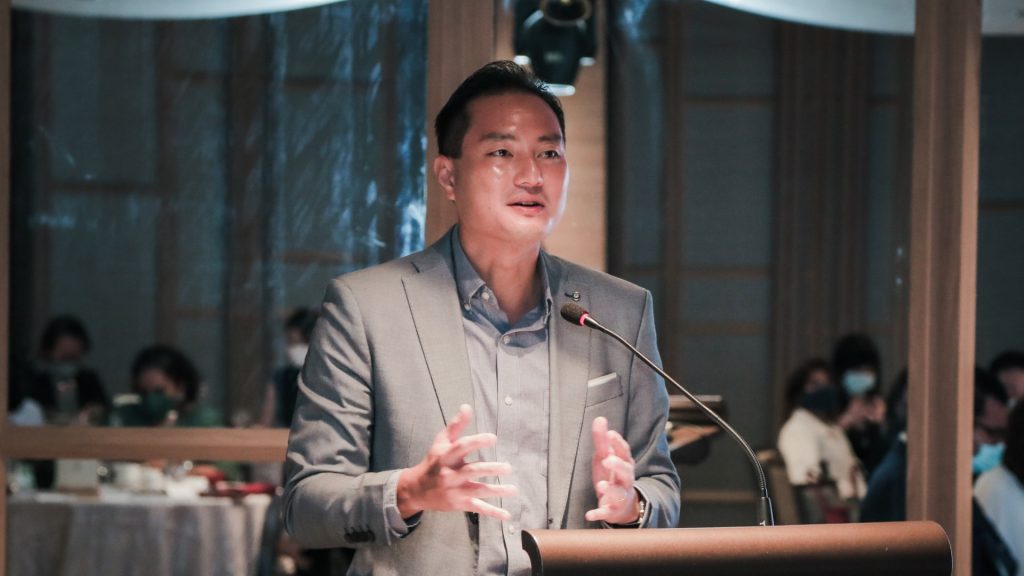
Held biennially since 1987, the PRISM Awards is one of the oldest and most prestigious awards in the industry, celebrating Singapore’s brightest stars in the communications and public relations industry. It is judged by a panel of established business leaders and senior practitioners, recognising and honouring organisations and individuals for excellence in public relations and communications.
Ms Koh Juat Muay, President of the IPRS Council 2021/2023 said, “The winning entries and the winners this year reveal a singular story – the resilience of our people, the ingenuity of the campaigns and strength of the organisations that continues to thrive in an evolving local and global communications landscape.”
“IPRS is privileged to hold PRISM Awards 2021 and share in the pride of profession demonstrated by our people and in the brilliance of their campaigns. Our winners truly embody the meaning of PRISM and that is Public Relations In the Service of Mankind,” she added.
This story first appeared in NUSNews on 21 December 2021.
NUS Faculty of Arts and Social Sciences' 18th Dean Takes Office
IN BRIEF | 2 min read
-
Dean of the Faculty of Arts and Social Sciences, Professor Lionel Wee, and other members of the Deanery take on their leadership roles today.
Professor Lionel Wee has assumed the position of Dean of the NUS Faculty of Arts and Social Sciences (FASS) and Co-Dean of the College of Humanities and Sciences (CHS) as of today, Friday, 1 October 2021. Prof Wee takes over the helm from Professor Robbie Goh, who is now the Provost of the Singapore University of Social Sciences.
Before becoming FASS' 18th Dean, Prof Wee was the Faculty’s Vice Dean of Research (2014-2021) and is a Provost's Chair Professor of Linguistics with the Department of English Language and Literature, which he headed from 2010 to 2014.
“It is an honour to be given the opportunity to helm the Faculty of Arts and Social Sciences. The Faculty has achieved much since its founding nearly a century ago, continually evolving to anticipate and address the needs and challenges of a changing society," said Professor Wee.
"Together with the Deanery, colleagues, and students of the FASS, I am confident that we will continue to make breakthroughs in both education and research. While these benchmarks are important, diversity and inclusion are priorities for me, and essential pillars of every organisation. My plan is to further emphasise and ensure our staff and students feel empowered and safe in the Faculty in the coming years," he said.
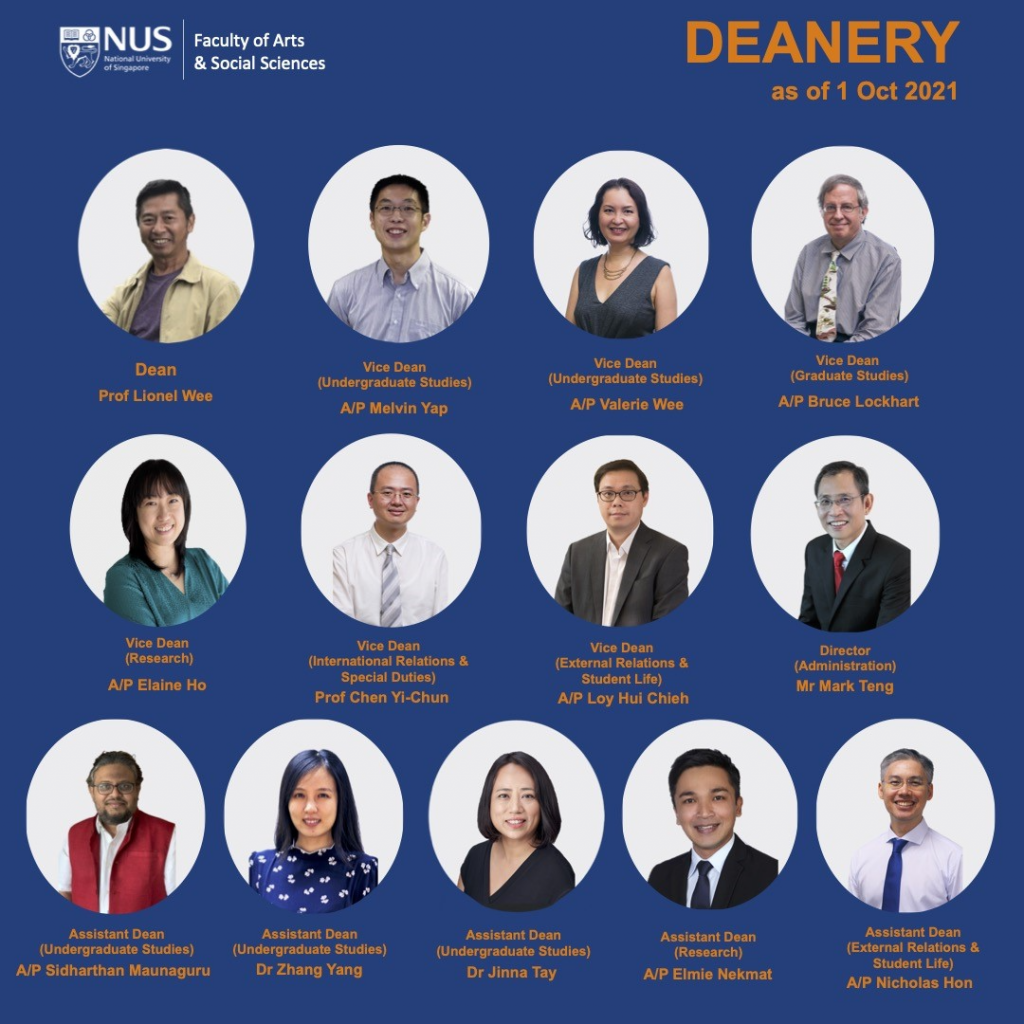
New Appointments to the Strong Leadership
Beginning their new roles with the FASS Deanery today are:
- Associate Professor Elaine Ho (Geography) as Vice Dean (Research). She was previously Assistant Dean (Research).
- Associate Professor Elmie Nekmat (Communications and New Media) as Assistant Dean (Research).
The following members of the Deanery will continue to serve in their respective positions:
- Associate Professor Melvin Yap, Vice Dean (Undergraduate Studies)
- Associate Professor Valerie Wee, Vice Dean (Undergraduate Studies)
- Associate Professor Bruce Lockhart, Vice Dean (Graduate Studies)
- Professor Chen Yi-Chun, Vice Dean (International Relations and Special Duties)
- Associate Professor Loy Hui Chieh, Vice Dean (External Relations and Student Life)
- Mr Mark Teng, Director of Administration
- Associate Professor Sidharthan Maunaguru, Assistant Dean (Undergraduate Studies)
- Dr Zhang Yang, Assistant Dean (Undergraduate Studies)
- Dr Jinna Tay, Assistant Dean (Undergraduate Studies) – recently appointed to the Deanery on 1 July 2021.
- Associate Professor Nicholas Hon, Assistant Dean (External Relations and Student Life)
Fewer, and Fewer
IN BRIEF | 2 min read
- In her review of the fourth instalment of the Maya Dance Theatre's PANCHA series in Lianhe Zaobao, Associate Professor Thang Leng Leng of the NUS Department of Japanese Studies (and Co-Director of Next Age Institute, as well as Fellow (Honorary) of the College of Alice and Peter Tan), delves into how the performance explores the notion of shared space and time and attempts to answer questions such as those surrounding relationships between the young and old in society.
Click through to read this article.
This story first appeared in Lianhe ZaoBao on 22 September 2021.
New NUS Dean of Arts and Social Sciences Appointed
IN BRIEF | 5 min read
-
Professor Lionel Wee will be appointed the new dean of the NUS Faculty of Arts and Social Sciences (FASS) and co-dean of the College of Humanities and Sciences from 1 October 2021.
-
Prof Goh, who has served as the Dean since 2017, will be taking a leave of absence from the University, but will continue to contribute in the Singapore education sector as the new Provost at the Singapore University of Social Sciences from 1 October 2021.
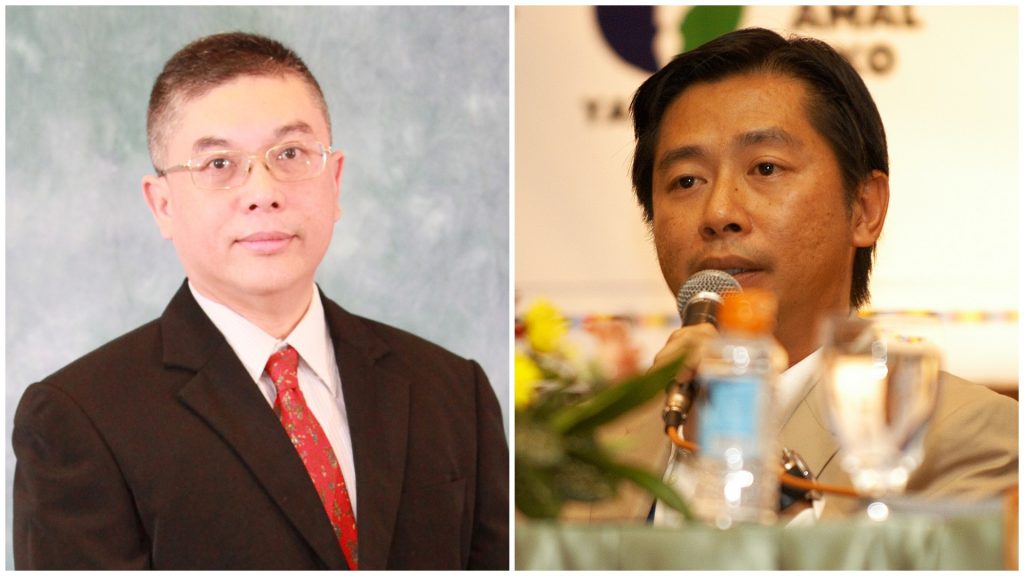
The University today announced the appointment of Professor Lionel Wee as the new Dean of its Faculty of Arts and Social Sciences (FASS) and Co-Dean of the College of Humanities and Sciences. Prof Wee will take over the helm from Prof Robbie Goh as the Faculty’s 18th Dean from 1 October 2021.
Currently FASS Vice Dean of Research and Professor of Linguistics in the Department of English Language and Literature, Prof Wee was appointed Provost’s Chair Professor in July 2017 for his outstanding scholarly achievements.
After graduating from NUS in 1988 with a Bachelor of Arts (First Class Honours) degree majoring in English Language and Sociology, Prof Wee embarked on an academic career, joining the University as a Teaching Assistant with the Department of English Language and Literature. He was awarded the NUS Overseas Graduate Scholarship where he pursued his PhD in Linguistics at the University of California, Berkeley. Prof Wee was appointed as a Lecturer upon his return to Singapore in 1995, and rose the ranks to full Professorship in 2012.
“NUS is pleased that after a rigorous global search, Prof Lionel Wee has been selected to be the next Dean. He is passionate about high quality education and research, and has an excellent understanding of FASS and the University, having served in numerous leadership roles at the department, faculty and university-levels. I am confident that he will bring the Faculty to new heights of international excellence,” said NUS President Professor Tan Eng Chye.
Besides serving as Vice Dean of Research at FASS from 2014 to present, Prof Wee was also the Head of the Department of English Language and Literature from 2010 to 2014. He had also contributed on various committees such as Chair of the FASS Faculty Promotion & Tenure Committee II, Chair of the University Mid-Term Advisory Report Committee, and Member of the University Promotion and Tenure Committee. In recognition of his dedicated service and contributions to NUS and education in Singapore, Prof Wee was awarded the National Day Awards Public Administration Medal (Bronze) in 2020 and the Long Service Medal in 2018.
“I am excited and honoured to be given this opportunity to lead my alma mater as its next Dean. Having spent more than three decades at FASS, both as a student and a faculty member, I have experienced firsthand the selfless commitment of my colleagues and impressive insights our students bring to the study of the arts, humanities and social sciences. I am confident that together, we can continue to make significant contributions to society while enhancing our Faculty’s standing as one of the leading humanities and social sciences faculties in the world,” said Prof Wee.
Besides his passion in linguistics, Prof Wee feels very strongly about animal welfare and is also very much an avid city traveller, although the pandemic has put quite a damper on travel in the past year or so. He also enjoys the cafes, a habit which he picked up during his time as a graduate student in Berkeley. Students and colleagues at FASS may have many a times seen Prof Wee deep in thought at the cafes across the NUS campus. He is very much focused in developing a particular idea or argument once he is seated down and would need to walk around before he can move on to another new idea.
Prof Wee has published widely in international and local journals, and also sits on the editorial boards of a number of academic journals and publications, including Applied Linguistics, English World-Wide, Multilingual Margins, The Journal of Asian Linguistic Anthropology, the “Cambridge Elements: World Englishes” book series, and the “Multilingualisms and Diversities in Education” book series. He is a well-respected scholar with research interests in the areas of language policy (especially in Southeast Asia), the grammar of Singapore English, metaphorical discourse, and general issues in sociolinguistics and pragmatics.
Prof Goh, who has served as the Dean since 2017, will be taking a leave of absence from the University. However, he will continue to contribute in the Singapore education sector as the new Provost at the Singapore University of Social Sciences from 1 October 2021.
Prof Goh said, “It has been a privilege and honour to serve as Dean of one of Singapore’s largest and most historied Faculties. I am grateful to my talented colleagues for all their hard work. I believe that together, we have brought the Faculty to new heights of excellence in teaching, research and service. I look forward to the work of creating new programmes and nurturing talent in my next role as Provost of the Singapore University of Social Sciences, and hope that I will also be able to forge new ties and collaborations between the two universities."
Having spent more than three decades at the University, Prof Goh has taken on numerous administrative and leadership roles outside of the Faculty. He was Deputy Director of the NUS Centre For the Arts from 1996 to 1999, and Deputy Director of the Asia Research Institute from 2008 to 2010.
“On behalf of the University, I would like to express my heartfelt appreciation to Professor Robbie Goh for his dedication and strong stewardship in leading NUS FASS. Under his visionary leadership, the Faculty has made significant contributions to the advancement of education and research in the humanities and social sciences. During his leadership, the FASS 2.0 Industry Tracks programme was started to enhance the employability of its graduates. New multidisciplinary initiatives such as the Philosophy, Politics & Economics programme were also established. The Faculty has also expanded collaborations with industry and further strengthened its high international reputation,” added Prof Tan.
This story first appeared on NUSnews on 13 August 2021. The full press release is here, and Professor Lionel Wee's biography is here.
NUS CHS Case Competition: Solutions for Tomorrow
IN BRIEF | 1 min read
- The NUS College of Humanities and Sciences has launched the Case Competition Series. Register your interest now!
 The NUS College of Humanities and Sciences has launched the Case Competition Series, which seeks to encourage undergraduate and post graduate students to apply their curriculum learning to tackle complex real-world challenges that require interdisciplinary approaches to their solution. The students, who are expected to work in teams comprising members from across different disciplines, will be presented with a complex problem (to be shared at the start of the competition in late July), and given four weeks to build their cases in consultation with participating industry and Faculty advisers before their presentation for the first round of judging. Scan the QR code below or just click here to register your interest as team leader for this competition now. More details will be released to participants next month.
The NUS College of Humanities and Sciences has launched the Case Competition Series, which seeks to encourage undergraduate and post graduate students to apply their curriculum learning to tackle complex real-world challenges that require interdisciplinary approaches to their solution. The students, who are expected to work in teams comprising members from across different disciplines, will be presented with a complex problem (to be shared at the start of the competition in late July), and given four weeks to build their cases in consultation with participating industry and Faculty advisers before their presentation for the first round of judging. Scan the QR code below or just click here to register your interest as team leader for this competition now. More details will be released to participants next month.
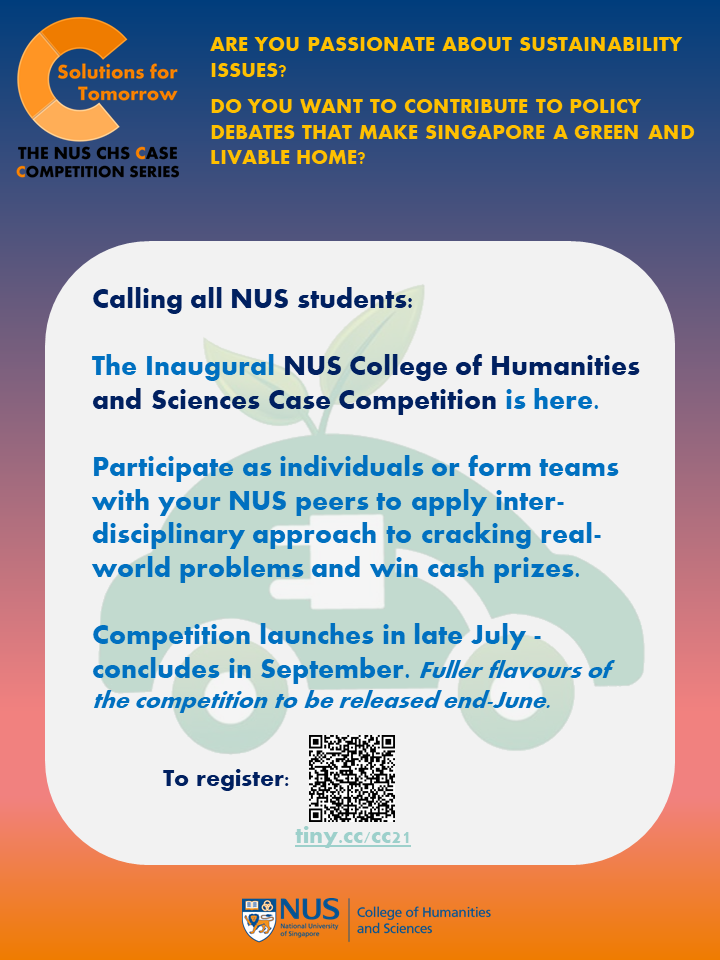
Honouring five outstanding alumni from Arts and Social Sciences
IN BRIEF | 3 min read
- Five exceptional NUS Faculty of Arts and Social Sciences (FASS) alumni from diverse backgrounds were lauded at the annual FASS Distinguished Arts and Social Sciences Alumni Awards 2020 in a simple presentation ceremony on 30 April at Swissotel The Stamford.
 (From left to right): FASS alumni Mr Yatiman Yusof, Mr Niam Chiang Meng, Ms Lim Sau Hoong, Mr Ravi Menon and Dr Liang Wern Fook have made singular contributions to the areas of the arts, education, media, finance, policy and community development.
(From left to right): FASS alumni Mr Yatiman Yusof, Mr Niam Chiang Meng, Ms Lim Sau Hoong, Mr Ravi Menon and Dr Liang Wern Fook have made singular contributions to the areas of the arts, education, media, finance, policy and community development.
Five exceptional NUS Faculty of Arts and Social Sciences (FASS) alumni from diverse backgrounds were lauded at the annual FASS Distinguished Arts and Social Sciences Alumni Awards 2020 in a simple presentation ceremony on 30 April at Swissotel The Stamford.
All have left their distinct mark in the wide-ranging fields that they serve. They are namely:
- Mr Yatiman Yusof (Geography and Malay Studies, ’72), Non-Resident High Commissioner of Singapore to Kenya
- Mr Niam Chiang Meng (Economics, ’83), Chairman of the Maritime and Port Authority of Singapore (MPA)
- Ms Lim Sau Hoong (Chinese Studies, ’83), Founder, Former CEO and Executive Creative Director of advertising agency 10AM Communications
- Mr Ravi Menon (Economics, ’87), Managing Director of the Monetary Authority of Singapore (MAS)
- Dr Liang Wern Fook (Chinese Studies, ’89 and Master of Arts, ’92), Writer, musician and educator
Congratulating the award recipients, FASS Dean Professor Robbie Goh said, “Ms Lim Sau Hoong, Dr Liang Wern Fook, Mr Ravi Menon, Mr Niam Chiang Meng and Mr Yatiman Yusof, have made singular contributions to the arts, education, media, finance, policy and community development. Not only do their wide-ranging achievements bring pride to the FASS family, but I believe that it also attests to the disciplinary range, intellectual curiosity and critical thinking that are the hallmarks of the FASS educational experience.”
This disciplinary diversity, Prof Goh elaborated, would soon be enhanced by FASS’ partnership with the NUS Faculty of Science in the NUS College of Humanities and Sciences (CHS) where students would be able to choose any major that is offered by both faculties. He added that this would be a major boost to FASS students’ educational experience as “the CHS common curriculum will prepare students for a disruptive world – by giving them a compulsory grounding in essential skills such as writing and communication, data literacy, digital literacy, design thinking and AI.”
Our alumni and their contributions
 Present at the ceremony were (clockwise from top left): FASS Dean Prof Robbie Goh; Mr Menon; Dr Liang; Mr Bernard Toh, Director of NUS Alumni Relations; Mr Niam; Ms Lim; Mr Yatiman; and NUS President Prof Tan Eng Chye.
Present at the ceremony were (clockwise from top left): FASS Dean Prof Robbie Goh; Mr Menon; Dr Liang; Mr Bernard Toh, Director of NUS Alumni Relations; Mr Niam; Ms Lim; Mr Yatiman; and NUS President Prof Tan Eng Chye.
A teacher and a journalist early on in his career, Mr Yatiman served key government appointments including as a Member of Parliament and Senior Parliamentary Secretary of the Ministry of Foreign Affairs and the then-Ministry of Information and the Arts, before his retirement in 2006. In addition to being Singapore’s non-resident envoy to Kenya, Mr Yatiman is a Board Member of the Singapore Press Holdings Foundation and the Chairman of the Malay Language Council of Advisors.
Contributing extensively to the public sector too was Mr Niam who served in the Ministries of Finance, Trade and Industry, Health, Law, and Information, Communications and the Arts – including Permanent Secretary appointments in several of these Ministries. He also served at the National Population and Talent Division, and the National Climate Change Secretariat. Aside from his current MPA chairmanship, Mr Niam is also the Chairman of Gardens by the Bay Pte Ltd and MediaCorp Pte Ltd.
A heavyweight in the media, marketing, and advertising industry, Ms Lim’s creative leadership of 10AM Communications has garnered over 300 prestigious global awards including The One Show, the Clio Awards, and the Communication Arts. Identified for her unique creative talent, Ms Lim was Visual Advisor to the Planning Committee for the 2008 Beijing Olympics’ Opening Ceremony and headed the Shanghai World Expo 2010 Singapore Pavilion Advisory Panel. In 2007, Ms Lim was awarded the President’s Design Award and was named Designer of The Year for her extensive contributions to media, marketing and culture in Singapore.
Prior to his appointment at MAS, Mr Menon served as Permanent Secretary at the Ministry of Trade and Industry, and Deputy Secretary at the Ministry of Finance. A recipient of the Singapore Government’s Meritorious Service Medal and Public Administration (Gold) Medal, he has served on boards in the public, private, and people sectors. He is currently Chairman of the Institute of Banking and Finance, and serves on the Board of Trustees of the Singapore Indian Development Association.
A singer-songwriter, poet and academic in Chinese literature and language, Dr Liang is a respected cultural figure and pioneer of Xinyao – a movement of locally composed Mandarin pop songs from the 1980s. To date, Dr Liang is the only artist who has received the National Arts Council’s Young Artist Award (Literature) and the prestigious Cultural Medallion (Music) across different art genres. He was also honoured recently with the Singapore Chinese Cultural Contribution Award for his outstanding contribution to the promotion, enrichment and development of Chinese Singaporean culture. His canon of work includes over 15 publications of literature, more than 200 songs, and two Mandarin musicals – a number of his most important works were written and composed during his university days.
On receiving the awards
Also present at the event was NUS President Professor Tan Eng Chye who presented the awards to the five alumni. Invited guests were also treated to videos of the award recipients who shared about their university days in FASS and their career highlights.
Recalling the moment he received news of the award, Mr Yatiman humbly shared, “To be frank, I’m quite surprised when I was told about it. And I thought there are hundreds, if not thousands of people who are more suitable to receive this award. I’m just a small worker in the community, not doing much in my lifetime. I think there are many others. So, for those who’ve been working hard for the good of the community, I take this award as recognition of their effort too.”
Mr Niam recalled some of his best memories were during university days where he learnt a lot about networking and life skills. It was also where he found his life partner. He said, “It is a privilege to be given this award. I would like to thank NUS and the organising committee for bestowing this honour on me and the other recipients…it means a great deal.”
 Taking the form of a rising star, the alumni award represents the inspiration these individuals bring to society through their brilliant contributions towards the Faculty, University and Singapore.
Taking the form of a rising star, the alumni award represents the inspiration these individuals bring to society through their brilliant contributions towards the Faculty, University and Singapore.
Established in 2015, the Awards recognise individuals for their distinguished scholarship and outstanding service to the Faculty, the University and Singapore. These outstanding recipients have made significant impact in various fields locally and internationally, which has contributed to the betterment and promotion of the arts and social sciences.
Previous recipients of the Awards include luminaries such as former President Mr S R Nathan, Emeritus Senior Minister and former Prime Minister Mr Goh Chok Tong, former United Nations Under-Secretary General Dr Noeleen Heyzer; Permanent Member of the Presidential Council for Minority Rights Mr Abdullah Tarmugi; and Executive Chairman of Banyan Tree Holdings Limited Mr Ho Kwon Ping.
Click here for more details on this year’s award recipients.
This story first appeared on NUSnews on 6 May 2021.
Singapore through the years: A digital cartographic record
IN BRIEF | 3 min read
- Professor Taylor and Associate Professor Feng Chen-Chieh, along with their department colleagues at NUS Geography, created Historical Maps of Singapore, an online resource hosted by NUS Libraries that provides a series of maps of different scales dating from 1846 to 2010.
 A plan of Singapore town and the adjoining districts produced by John Turnbull Thomson, a Government Surveyor, and published by J.M. Richardson in London in 1846.
A plan of Singapore town and the adjoining districts produced by John Turnbull Thomson, a Government Surveyor, and published by J.M. Richardson in London in 1846.
From quiet colonial backwater to thriving city-state, Singapore has undergone rapid transformation over the last 200 years or so.
If you are interested in finding out how the Central Business District has developed since the 1828 Jackson Plan or have a general interest in the country’s ever-changing landscape, do check out Historical Maps of Singapore, an online resource created by NUS Geography and hosted by NUS Libraries.
Historical Maps of Singapore provides a series of maps of different scales dating from 1846 to 2010. The maps have been carefully converted to a digital format and georeferenced to facilitate cross-comparison.
The work was funded through a Strategic Initiative award from NUS, and both the Singapore Land Authority and Ministry of Defence kindly provided permission for the maps to be made available online.
NUS Geography faculty members who worked on the project included the Head of Department Professor David Taylor, as well as Associate Professor Feng Chen-Chieh.
“Maps are extremely important resources, and not only for geographers. Maps are time-stamped windows not only on the ever-changing landscapes they represent in reduced form but also on the minds and values of the map-makers and those who they thought might be interested in the results of their endeavours,” said Prof Taylor.
“For example, the 1873 map shows the locations of 29 police stations, but only one hospital ~ was crime really a much greater concern than health in late 19th century Singapore? Making the maps available in digital form opens them to a wider audience and to new forms of analysis.”
 (From left to right) The changing landscape of the Telok Ayer Basin from 1860 to 1993.
(From left to right) The changing landscape of the Telok Ayer Basin from 1860 to 1993.
The online resource is being used in teaching by NUS Geography, and has proved particularly valuable during the COVID-19 pandemic when teaching was moved largely online.
The digitised maps have also been used in research. For example, geographers have used the maps as a basis for plotting changes in Singapore’s coastline and the extent to which coastal habitats such as mangrove forests have been lost, while researchers at NUS Chinese Studies have plotted changes in the locations of Chinese temples and kampungs – and in some cases their disappearances.
The Historical Maps of Singapore web-based resource has been made as straightforward as possible to use. Once on the website, users may select the maps that they are interested in and zoom in and out, revealing higher or lower levels of detail. They can also arrange several maps on top of one another as layers, and search for common features on the different maps. Layer swipes can also be done to compare different maps.
Clicking on the metadata, one can also view a description of the map, provenance and citation. These maps can be exported and viewed in Google Earth, QGIS or ArcGIS as layers. These features provide researchers and students from a range of disciplines with the analytical and visualisation tools needed to carry out more detailed studies of the digitised maps.
 Users may swipe to compare the maps over different years.
Users may swipe to compare the maps over different years.
Prof Taylor added, “The popularity of the Historical Maps of Singapore web-based resource has not surprised me. Singapore has changed so much in a relatively short period of time.
“Maps are one way of capturing and evaluating those changes. But they are capable of providing much more than a simple record of change. I hope that we are able to add to the current collection of digitised maps and associated resources in the coming years as we move increasingly into an era where geospatial information underpins so much of what we do and who we are”.
This story first appeared on NUSnews on 22 April 2021.
Eminent NUS historian Professor Wang Gungwu receives prestigious Tang Prize
The 2020 Tang Prize in Sinology has been awarded to Professor Wang Gungwu, University Professor at NUS Arts and Social Sciences and one of the world's foremost experts on the Chinese diaspora.
Announced on 20 June 2020 by the Tang Prize Foundation, this prestigious award was conferred on Prof Wang in recognition of his trailblazing and dissecting insights on the history of the Chinese world order, overseas Chinese, and Chinese migratory experience.
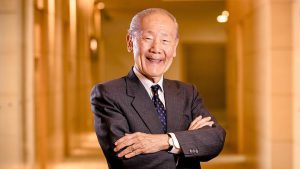
As a leading scholar on Sino-Southeast Asian historical relations, Prof Wang developed a unique approach to understanding China by scrutinising its long and complex relationship with its southern neighbours. His erudition and critical discernment have significantly enriched the explanation of China’s changing place in the world, traditionally developed from an internalist perspective or in relation to the West.
Prof Wang said, “It is a great honour to be awarded the Tang Prize in Sinology. When I was a student, Sinology was part of Oriental Studies and associated with classical studies, guoxue (国学) in China, Hanxue (汉学) in Japan and Europe. It was centred on ancient philology as the foundation for the study of literature, philosophy and history. The four previous awardees, Yu Ying-shih at Princeton, Ted de Bary at Columbia, Shiba Yoshinobu at Tokyo and Stephen Owen at Harvard, started with the study of classical Chinese. Yu and de Bary went on to enrich our knowledge of intellectual history while Shiba did the same for social and economic history. Although Owen is best known for his contributions to literature, his work on literary theory has illuminated key features of the historical imagination.”
“I am a historian who believes that China’s present cannot be separated from her total past. Living all my life outside China, I am fascinated by the way China had fallen and risen several times. Each time that happened had made a difference to the course of world history. For us to understand why that could happen requires us to go beyond the humanities to the social sciences. I am gratified that modern Sinology now recognises the centrality of shi (史) in Chinese civilisation,” he added.
One of Asia’s most important intellectuals
Prof Wang Gungwu has been University Professor at NUS Arts and Social Sciences since 2007, and Emeritus Professor of the Australian National University since 1988. He is Foreign Honorary Member of the History Division of the American Academy of Arts and Science and former President of the Australian Academy of the Humanities. Prof Wang received his BA and MA from University of Malaya (UM) in Singapore, and PhD at SOAS, London.
Spending much of his life immersed in different cultures gives Prof Wang diverse personae as a scholar. He is an “insider” in the academic tradition of Chinese Confucianism and British elite education, and an “outsider” in the interpretation of China’s perception of the world. His original approach to understanding China from the southern perspective is in part a natural choice given his personal experience. This same experience provided him with abundant inspiration in his formative years as he matured into an authoritative voice in the analysis of China’s worldview.
Besides being an outstanding scholar, Prof Wang has been an inspiring educator since he embarked on an academic career first at UM and subsequently at the Australian National University, before making his mark as Vice Chancellor of the University of Hong Kong from 1986 to 1995, Chairman of the Institute of East Asian Political Economy from 1996 to 1997, and Director of the NUS East Asian Institute from 1997 to 2007.
At 89 years old, Prof Wang is still very prolific as a scholar. “I am writing on Chinese hopes and fears following China’s opening and reforms, focusing on the period after the People’s Republic of China’s entry into the United Nations in October 1971,” he shared.
And when asked how COVID-19 has impacted him, Prof Wang said, “COVID-19 has moved me away from my routines and made me parcel my life more carefully and take into account how much time I might have to get my work completed.”
The biannual Tang Prize consists of four categories, namely Sustainable Development, Biopharmaceutical Science, Sinology and Rule of Law. It aims to promote the interaction and cooperation between cultural and technological research so as to find a 21st century path to the sustainable development of the world.
This article was first published on 22 June 2020 in NUS News at https://news.nus.edu.sg/highlights/eminent-nus-historian-professor-wang-gungwu-receives-prestigious-tang-prize.
Laptops for low-income families: Addressing digital inequity
 As the COVID-19 situation escalated in Singapore, additional measures were introduced, including home-based learning (HBL) for all schools and working from home for all workplaces except for essential services. These circumstances threw a light on the difficulties that some families who may not have any laptops at home or only one laptop to share between multiple children, are facing. These children are at risk of missing online lessons.
As the COVID-19 situation escalated in Singapore, additional measures were introduced, including home-based learning (HBL) for all schools and working from home for all workplaces except for essential services. These circumstances threw a light on the difficulties that some families who may not have any laptops at home or only one laptop to share between multiple children, are facing. These children are at risk of missing online lessons.
NUS staff, students and alumni are stepping in to help.
After speaking to founder of charity organisation Daughters of Tomorrow Ms Carrie Tan, Dr Natalie Pang, Senior Lecturer from the NUS Arts and Social Sciences (FASS) Department of Communications and New Media (CNM) learnt that many low-income families were struggling to find laptops to support their children’s learning needs, particularly those with more than one child at home. This kick-started CNM’s ‘Laptops for Families’ campaign.
Starting in April, the campaign aimed to raise funds for second-hand laptops to support these children and their families. The Department reached out to its faculty, students and alumni contacts via email and social media. In addition to the generous support from faculty and alumni, many students came forward and offered their smart devices and online tutorial assistance.
“When the number of COVID-19 cases began increasing in Singapore, I was concerned about the impact on families, especially low-income families. Things that many of us take for granted – an iPad, a laptop, and a fast Internet connection – have become essentials in this crisis, but may not be accessible to these families. Some families only have one laptop to share between multiple children and working parents,” said Dr Pang. Together with Ms Tan, Dr Pang worked quickly to raise the funds to purchase second-hand laptops for 16 families within two weeks, and right before the Circuit Breaker started.
These laptops were delivered directly to the 16 families by the laptop reseller. Later, thanks to the generosity of the donors, another 12 laptops were donated to the Kolam Ayer Youth Network to support their underprivileged students from YYD Education Centre.
With the success of the initial campaign, the Department is now working with the People’s Association Youth Movement (PAYM) to supply laptops to another 46 families. In this expanded campaign, CNM is also collaborating with the NUS FASS Club to reach out to more NUS students to volunteer as online tutors.
“Digital equity doesn’t stop at having access to devices. It is also about sharing knowledge and helping to build the children’s resilience against online dangers. In the movement, the Department also hopes to also train and prepare tutors in this area so they can better support the children,” said Dr Pang.
“It is part of NUS FASS Club’s vision to empower students in the Faculty of Arts and Social Sciences to impact and contribute to society. We are honoured to be able to extend our helping hand to vulnerable groups in our society; this meaningful campaign is an opportunity for students to make a difference to children from low-income families who are especially vulnerable during this crisis.” Year 2 CNM student Chen Jia Jia, NUS FASS Club Vice President (Operations).
Alumni have also been supporting vulnerable families. In April, FASS alumnus, former national sprinter Mr U.K. Shyam, initiated a donation drive, with the aim to collect 600 laptops and tablets for these families.
‘Laptops for Families’ is the first initiative under CNM’s ‘Communication for Public Good’ fundraising campaign. To contribute to this effort, please go to www.give.asia/cnmlaptops by Sunday, 31 May, 2359h.
By NUS Arts and Social Sciences
Gratitude: The Emotion That Reduces Competitive Behaviour
 The outbreak of COVID-19 has brought upon tremendous stress on millions of people worldwide. Health concerns, financial uncertainties, and a prolonged and potentially irreversible departure from one’s normal way of life all contribute to a trying experience. While some people react to these stressors with acts of generosity and kindness, others behave in a selfish and competitive manner: hoarding supplies, violating social distancing regulations, or posting others’ violations online for public ridicule and name calling.
The outbreak of COVID-19 has brought upon tremendous stress on millions of people worldwide. Health concerns, financial uncertainties, and a prolonged and potentially irreversible departure from one’s normal way of life all contribute to a trying experience. While some people react to these stressors with acts of generosity and kindness, others behave in a selfish and competitive manner: hoarding supplies, violating social distancing regulations, or posting others’ violations online for public ridicule and name calling.
How can we stave off competitive impulses at a time when solidarity and cooperation are most needed? In our recent research that was published in Cognition and Emotion, we found that feelings of gratitude may play a key role.
Gratitude is the positive emotion that people feel when they benefit from the intentional and thoughtful actions of another person. Past research has shown that feeling grateful can spur cooperation and coordination between individuals in neutral and friendly environments. In this new project, we sought to provide a stronger test by looking at the effect of gratitude in social interactions that have already turned antagonistic. Since competitive and destructive intents tend to be the strongest here, we wondered whether feelings of gratitude can suppress these ‘dark’ urges.
In the first study, participants were invited to play a game with a partner. Each participant controlled a ‘trucking company’ and tried to maximise its profit. Specifically, they needed to decide which routes to send the trucks on in order to reach the destination. Only when a truck has reached the destination, could participants send in the next. Each truck that reached the destination brought in profit to the company and, just like in real life, the shorter the routes the trucks took, the more the company earned.
The shortest route, however, was shared between the two players. This gave the players opportunities to cooperate, by using tit-for-tat strategies, or to compete, by blocking the route with their own truck or a gate they controlled.
As the game began, participants quickly realised that their partner was behaving very competitively. So did they retaliate by becoming competitive as well? Our results suggested that it depended on how they were feeling.
In a seemingly unrelated task earlier, participants recounted a past event where they felt grateful, joyous, or neutral. Hence, participants entered the trucking game with different feelings induced. We found that participants who felt grateful were the least vindictive against the competitive partner, who was actually a set of pre-scripted computer moves.
We know that this effect was not due to simply a good feeling because participants induced to feel joyous behaved as competitively as those with a neutral feeling. In other words, gratitude uniquely inhibited competitive impulses.
In the second study, we recruited online participants. After the same emotion induction procedure, participants competed with a partner, who again was a computer programme, in a language proficiency task. They were told that only the winner would have a chance to enter an attractive lottery, if the winner also excelled in a follow-up test. In our experiment, all participants were designed to lose and were given the job of preparing the follow-up test for the winning partner.
This presented a chance for participants to secretly sabotage the partner, for they could choose unfairly challenging questions to reduce the partner’s odds of winning the lottery. Rationally speaking, participants would gain nothing from such sabotage; they were already out of the game. But many succumbed to the competitive urge nonetheless. More importantly, we found that feeling grateful prior to entering the games reduced participants’ sabotaging behaviour.
It is important to note that at the end of the experiments, participants were thoroughly explained of the purposes of the studies and the deceptions involved. In the case of Study 2, all participants were given an equal chance to enter the lottery.
There is a reason behind the old saying that gratitude is the parent of all virtues. Feeling grateful reduces one’s egoistic, selfish needs and engenders a more community- or other- focused outlook in life. Indeed, it has been well-established that gratitude promotes prosocial behaviour and cooperation. Our new findings extend this line of evidence by showing that gratitude may arrest a downward spiral of mutual competition in social interactions that have already turned sour or hostile.
What implications do these findings have in the COVID-19 situation? Perhaps if we spend more time to think about the help and little acts of kindness we have received in life, and be grateful for them, we are more likely to become caring and supportive members of the community. Instead of being offended by others’ unintentional transgressions, which is made all too easy by the COVID-19 related stressors, we could react to them with empathy and understanding. Besides, research has also shown that feeling gratitude boosts one’s psychological well-being and life satisfaction. Be good to others. Be good to ourselves.
Practicing gratitude is certainly not a panacea to all our problems. But in this pandemic, we can use all the help we can get.
By Assistant Professor Jia Lile, NUS Psychology.
Solidarity in an ageing society
Associate Professor Corinne Ghoh from NUS Social Work and Co-Director, Next Age Institute moderated the discussion on whether Singaporeans’ increased life expectancy was a boon or a bane.
A hand for low-income families
The Next Age Institute (NAI) at NUS Arts and Social Sciences is developing a new Singapore Financial Capability and Asset Building (FCAB) curriculum to enhance social work education locally and better equip social work professionals to help low-income vulnerable individuals and families manage their finances.
Child Development Accounts Expanded in Singapore
March 25, 2016
In its annual budget message, the Singapore government announced on March 24, 2016, that Child Development Accounts, as of that date, are significantly expanded. The expansion is an automatic deposit into the CDAs of all newborns in the amount of S$3,000, which is US$2,220 at current exchange rates. The purpose is to make CDAs fully inclusive, that is, all babies are building assets.
Singapore already had the most extensive asset-building policies for children and youth of any country. And this expansion of CDAs, in itself, eclipses the asset-building policy for children of any other country.
The focus of CDAs in Singapore, as with much of its social policy, is on human development. These are funds intended to support development and education of the child. Other child development initiatives were also announced in the budget message, including plans for intensive early childhood education for all children.
Michael Sherraden was in Singapore at the time of the announcement, working as the S.R. Nathan Distinguished Visiting Professor of Social Work at National University of Singapore (NUS). Center for Social Development at Washington University has a sister Center for Social Development (Asia) at NUS, and Washington University has a special partnership in social innovation with NUS called Next Age Institute.
Top 100 Asian Scientist Chwee Teck LIM of NUS Visited WU
March 24, 2016
Next Age Institute extended a warm welcome to Professor Chwee Teck LIM of National University of Singapore who visited the School of Engineering & Applied Science (SEAS) at Washington University in St. Louis (WUSTL) on March 23-24, 2016.
During the visit, Professor Lim had opportunities to exchange research ideas with select SEAS faculty members and to meet WUSTL’s leadership including James Wertsch, Vice Chancellor for International Relations, Dedric Carter, Vice Chancellor for Operations and Technology Transfer, and Aaron Bobick, Dean and James M. McKelvey Professor of SEAS.
Professor Lim delivered a presentation titled Microfluidic Technologies for Disease Diagnosis, Personalized Medicine to Wearable Device Applications as part of the Speakers Series at Department of Mechanical Engineering & Materials Science.
Professor Lim is a Provost’s Chair Professor at the Department of Biomedical Engineering and Mechanobiology Institute at the National University of Singapore. He was recently named as one of the Top 100 Asian Scientists in 2016.
Congratulations to three NUS professors named as Top 100 Asian Scientists
February 12, 2016
Next Age Institute congratulates three professors from National University of Singapore (NUS) on being selected as the Top 100 Asian Scientists:
- Professor Lim Chwee Teck, Provost’s Chair Professor; Deputy Head, NUS Bioengineering; Group Head, NUS Centre for Advanced 2D Materials; Principal Investigator, Mechanobiology Institute at NUS;
- Professor Andrew Nee from NUS Mechanical Engineering; and
- President Professor Tan Chorh Chuan of NUS
The selection criteria for honorees are 1) the honoree must have received a national or international prize in the last two years for his or her scientific research through competitive selection, 2) made a significant contribution in scientific discovery, or displayed leadership that has benefitted either academia or industry.
Workshop in Singapore explored the role of partnerships in international volunteering
December 9, 2015
The Next Age Institute at WUSTL co-sponsored a two-day Workshop on Development Partnerships: The Role of International Volunteering at National University of Singapore explored the role of partnerships in international volunteering to address global inequalities. Participating scholars of an interdisciplinary and globally-diverse range of countries and universities discussed how international development volunteering can contribute to more equitable, mutually beneficial, and sustainable development partnerships and made plans for new collaborative research.
Benjamin Lough, Faculty Director of International Service at the Center for Social Development at WUSTL, presented a paper on “The Changing Role of International Volunteer Cooperation Organizations as Alternative Development Actors”.
Selected papers coming out of the workshop are planned for publication in a special issue of the Third World Quarterly focusing on the changing role and impact of international volunteering in development partnerships.
The Faculty of Arts and Social Sciences of National University of Singapore organized the Workshop. Professors Tracey Skelton of NUS, Susanne Schech of Flinders University, and Uma Kothari of University of Manchester were the lead organizers.
The co-funding for this workshop was provided in honor of Mr. S.R. Nathan, distinguished and longest-serving President of Singapore (1999-2011). Mr. Nathan has expressed his belief that many more people should volunteer. The Next Age Institute embraces Mr. Nathan’s vision for Singapore and the Asia-Pacific region. Michael Sherraden, NAI Director at WUSTL, is the S.R. Nathan Professor of Social Work at NUS.
In follow-up to the ideas presented at this workshop, Washington University will co-sponsor a conference on U.S. international volunteering at the Brookings Institution on June 14, 2016. This conference will focus on international volunteering within the 2030 UN sustainable development agenda: Forging Global Development Outcomes, Research, and Alliances. A further conference focusing on international volunteering research in ASEAN is being planned with partners at National University in Singapore for March 2017.
NUS scholars speak at Washington University about Singapore housing policy
December 3, 2015
Two scholars from the National University of Singapore (NUS) spoke December 2 at Washington University in St. Louis about the roles that housing policies play in the well-being of Singaporeans. Singapore’s inclusive policies provide opportunities for home ownership, community integration and stability, and economic security.
Chia Ngee Choon, associate professor of economics and co-director of the Next Age Institute (NAI), and Wong Yunn Chii, associate professor and head of the Architecture Department at NUS, made presentations at the seminar “Housing Policy and Community Stability” at the Brown School. A video of the event is available here.
Bruce Lindsey, dean of architecture at Washington University, moderated, and Michael Sherraden, co-director of NAI and the George Warren Brown Distinguished University Professor at Washington University, served as the respondent.
The event was hosted by NAI and The Sam Fox School of Design & Visual Arts. Co-hosts included the Harvey A. Friedman Center for Aging and the McDonnell International Scholars Academy.
Singapore’s Deputy Prime Minister revealed well-planned neighborhoods as the ‘secret sauce’
December 1, 2015
Singapore’s Deputy Prime Minister Tharman Shanmugaratnam offered insights on Singapore’s use of housing policy and urban planning as levers for stability and social inclusion during a recent event at Brookings Institution in Washington, D.C.
He was the keynote speaker at “Housing, Inclusion and Social Equity: An International and U.S. Perspective,” where scholars and policymakers gathered Nov. 30 to discuss policies and practices, Washington University in St. Louis (WUSTL), Brookings Institution, Duke University, and the National University of Singapore sponsored the event.
Housing and neighborhoods directly affect racial inclusion and social equity. When housing and neighborhood policies and design are not inclusive, many nations face the challenge of promoting economic opportunity and social mobility.
The event at Brookings Institution featured experts from the United Kingdom, Singapore, India, and the United States, who offered comparisons and policy insights.
Singapore’s case is distinctive for creating widespread homeownership and integration by ethnicity and religion. Shanmugaratnam pointed out that in his country “we’ve always thought … in terms of economic and social policies intertwined.”
The homeownership rate in Singapore is 90 percent, compared with 65 percent in the United States and the United Kingdom. “The essential point is the lower-income group has not been left out in… the accumulation of home equity,” he said.
Shanmugaratnam has previously served as Education Minister, and as Finance Minister. In October 2015, he was appointed Coordinating Minister for Economic and Social Policies. In addition, he is chairman of the Monetary Authority of Singapore, Singapore’s central bank.
“The secret sauce is our neighborhoods,” he said. They are carefully designed and planned to maximize interaction and to give Singapore the best chance of an integrated society, he said. “It’s about the everyday experiences that come about because of the design.”
Currently, eight in ten Singaporean households have a park within a ten-minute walk, he said, and that number will increase to nine in ten by 2030. The parks are “quality spaces for young and old, regardless of your social status.”
Singapore’s “most intrusive social policy” is a set of rules that ensure no neighborhood develops a large ethnic concentration, he said. “That’s what’s held our society together,” he said, noting that people of different ethnicities, religions and economic status interact every day, and that their children grow up together.
“Multiculturalism is a source of pride” in Singapore, he said, and a source of peace.
Michael Sherraden, the George Warren Brown Distinguished University Professor at Washington University and director of the Next Age Institute at the university, introduced Shanmugaratnam. In the United States, Sherraden said, “if we don’t figure out residence and race, our prospects don’t look that good.”
Neighborhoods full of poverty lead to “very poor outcomes in general for the children we want to raise for the next generation,” he said, yet the U.S. has not delved deeply into addressing such problems.
David Conner, Retired CEO and Director, Oversea-Chinese Banking Corporation (OCBC), and a member of Board of Trustees at WUSTL, responded to Shanmugaratnam’s keynote speech by relating how OCBC partnered with the Housing Development Board (HDB) in financing public housing. “The Lesson is very clear: public and private partnership can work and can be quite effective”, Conner said.
James V. Wertsch, Washington University’s David R. Francis Distinguished Professor, vice chancellor for international affairs and professor of anthropology, also welcomed the crowd on behalf of Washington University.
“Today is an exampleof how we can look at housing equity as an issue that exists not only in the United States … and the ways that we can come together with better solutions maybe for places everywhere.”
A video of the event is available here, as are the speakers’ PowerPoint presentations.
From The Straits Times: New Research Institute to Tackle Ageing Issues
By Calvin Yang, March 18, 2015
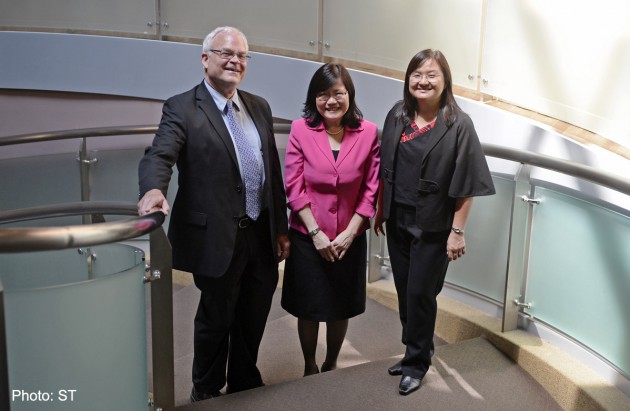
From understanding the elderlys challenges to coming up with innovations to boost support for their caregivers, a research facility dedicated to helping Singapore deal with an increasingly older population was unveiled yesterday.
The Next Age Institute (NAI) is an academic partnership between the National University of Singapore (NUS) and Washington University in St Louis (WUSTL) in the United States.
It will tackle social issues arising from an ageing population, such as intergenerational relationships and financial adequacy.
Its research includes disciplines like social work, economics, law, medicine, engineering and architecture.
"Ageing is a complex phenomenon and we need researchers from various disciplines to come together to share their findings," said Associate Professor Corinne Ghoh, NAI co-director at NUS. "Only then can we examine the issues from different perspectives and make a greater impact."
By 2030, one in five residents are expected to be 65 or older.
"Our old-age support ratio is falling and elderly parents will be increasingly dependent on a smaller number of adult children," said Senior Minister of State for Health and Manpower Amy Khor at yesterday's launch.
"While science and technology have added more life years, the challenge for us is to innovate new ways to translate these additional years in lifespan to healthy and productive years of life."
This year, the NAI, which is based at NUS and WUSTL, will begin a pilot study on care services for elderly patients who have been hospitalised for serious conditions, such as stroke and hip fractures, and the care they receive after discharge.
The research, involving 30 families, will look into the possibility of conducting another one-year longitudinal study to track the caregiving support for seniors and their family members.
These include day-care centres and family caregiving arrangements.
The institute will also embark on other research projects, including studying options for financing retirement needs. "The focus of the institute is not just on ageing people," said Professor Michael Sherraden, NAI director at WUSTL.
"It is also on social issues that arise and are interrelated with the ageing population, and creating appropriate social innovations to address them."
Similar reports were carried in:
Sherraden appointed to named professorship in Singapore
February 14, 2014

Michael Sherraden, PhD, George Warren Brown Distinguished University Professor and director of the Center for Social Development (CSD) at the Brown School, has been named the inaugural S. R. Nathan Professor at the National University of Singapore (NUS). The Nathan Professorship has been established to honor the recently retired President of Singapore, former NUS Chancellor and alumnus of the Faculty of Arts and Social Sciences.
National University of Singapore announced this new appointment at an event on Feb. 17, where Sherraden gave a public lecture entitled “Innovations in Asset Building.” Sherraden will work at NUS through the month of February, then return to his work at the Brown School. He may retain the Nathan Professorship on a part-time basis of one or two months per year over the next several years.
“The S.R. Nathan Professorship is a great honor for me and for Washington University in St. Louis,” Sherraden says. “I have enjoyed friendships and partnerships with colleagues in Singapore since a Fulbright Research Fellowship more than 20 years ago. Also, I am very pleased to serve as WUSTL’s ambassador to NUS in the McDonnell Scholars Academy. We are working to make the relationships between our two excellent universities even stronger.”
Sherraden has spent part of his academic career in groundbreaking applied research, testing strategies to include the poor in building assets. The idea is that holding even modest assets may promote positive social and economic outcomes. His 1991 book, Assets and the Poor: A New American Welfare Policy, proposed establishing individual development accounts for the whole population, with progressive funding for the poor via government and private sector matching of individual contributions.
In 1994, he established CSD, in part to study asset building strategies. CSD has also made important contributions to research and policy development in civic service, productive aging, thriving communities and other areas. NUS established the Centre for Social Development in Asia (CSDA) in 2006, as a sister to CSD.
Over the past two decades, Sherraden has consulted in research and policy in many countries, including the United Kingdom, Canada, Mexico, China, Korea, Indonesia, Nepal, Colombia, Peru, Israel, Ghana, and South Africa. He has served as an adviser and consultant to the White House, Department of the Treasury, Department of Housing and Urban Development, Department of Health and Human Services, and many non-profit and private sector organizations. In 2010, Time Magazine named Sherraden to its “Time 100,” the publication’s annual list of the 100 most influential people in the world.
Nathan was sworn in as Singapore’s sixth President in 1999. He is the longest-serving President in Singapore’s history, announcing in 2011 that he would retire at the age of 87. Prior to serving as President, Nathan held several prominent civil service posts, including Ambassador to the United States from 1990-96.
“It is a significant honor and responsibility to carry the name of S.R. Nathan in my professorship at NUS,” noted Sherraden. “President Nathan has done so much for his country and for the world. We will sincerely try to build upon his exceptional career and accomplishments. If we can increase knowledge and policies for successful social innovations, we will be going in the right direction.”
Original story can be read HERE.


